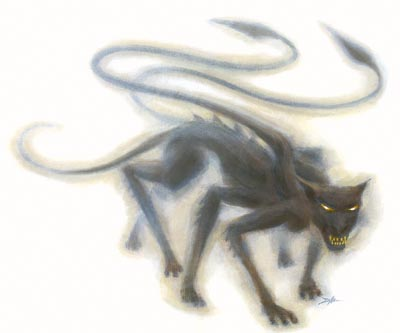Introduction
Welcome to my 5e conversion of stat blocks from Libris Mortis! My name is badooga (/u/badooga1 on reddit, badooga#8108 on discord), and I'm converting the entire Libris Mortis book from 3rd edition to 5th edition. This document contains stat blocks and creature templates that are all directly taken from and/or inspired by the original book and its monsters.
As of right now, the full book conversion is not out yet (this will be edited with a link when it is). Please feel free to use the following stat blocks in your games. To see the other homebrew that I've made, see this link: Badooga's Homebrew.
Table of Contents
-
2Creatures
- 2Angel of Decay
- 3Atropal Scion
- 4Blaspheme
- 5Bleakborn
- 6Blood Anmniote
- 7Bloodmote Cloud
- 8Bone Rat Swarm
- 9Boneyard
- 10Carcass Eater
- 11Cinderspawn
- 12Corpse Rat Swarm
- 12Dire Maggot
- 13Crypt Chanter
- 14Desiccator
- 15Dream Vestige
- 16Entomber
- 17Entropic Reaper
- 18Forsaken Shell
- 19Grave Dirt Golem
- 20Gravetouched Ghoul
- 21Hulking Corpse
- 22Murk
- 23Plague Blight
- 24Quell
- 25Raiment
- 26Skin Kite
- 27Skirr
- 28Skulking Cyst
- 29Slaughter Wight
- 30Slaymate
- 31Spectral Lyrist
- 32Tomb Mote
- 32Tombstone Golem
- 33Visage
- 34Voidwraith
- 35Wheep
-
36Templates
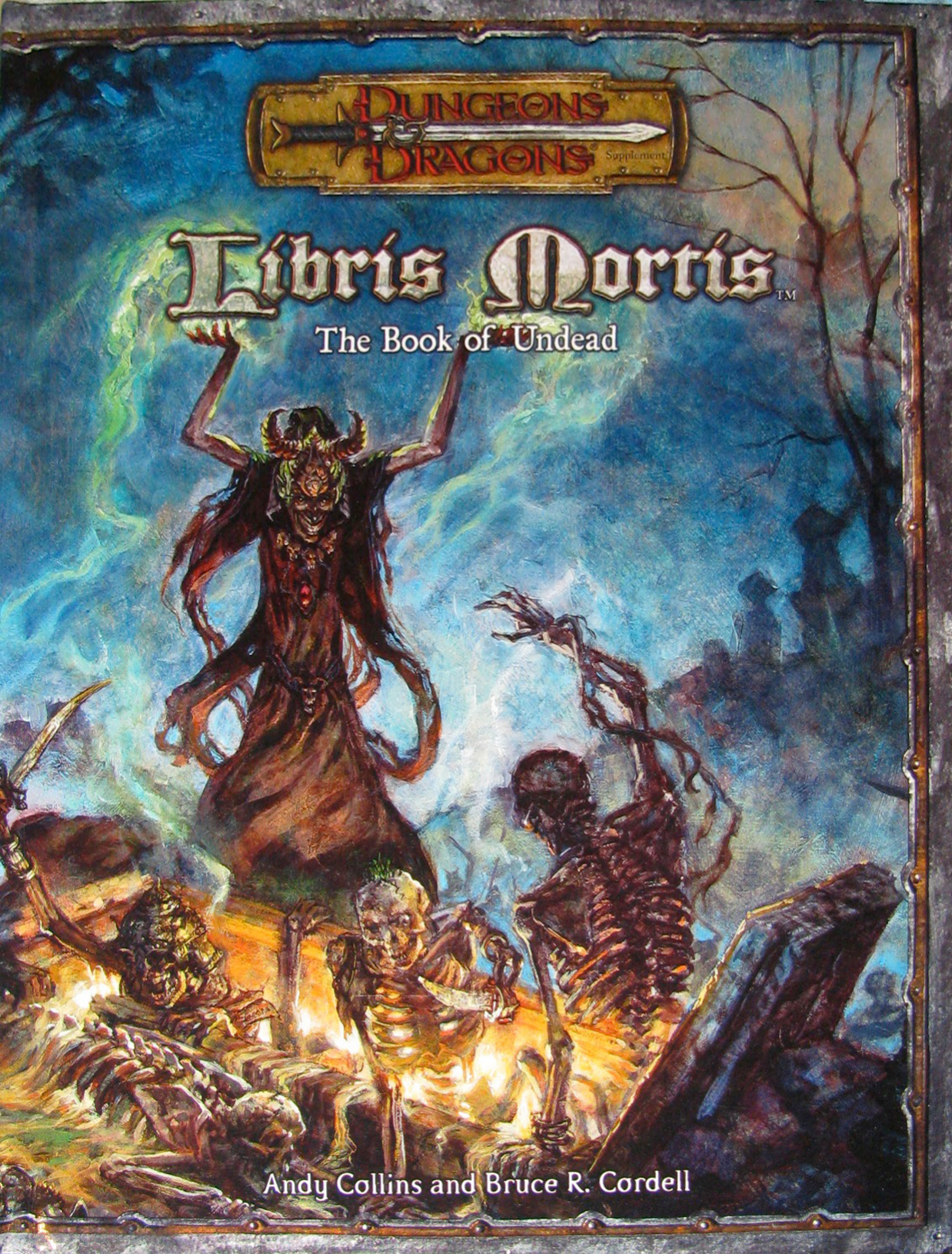
Art Credits
All art is taken from the original Libris Mortis, except for the Angel of Decay, which was taken from its 4th edition source. As such, the source of all art here is Wizards of the Coast.
Monsters
Angel of Decay
Large undead, chaotic evil
- Armor Class 16 (natural armor)
- Hit Points 85 (10d10 + 30)
- Speed 30 ft., fly 50 ft.
STR DEX CON INT WIS CHA 16 (+3) 17 (+3) 16 (+3) 16 (+3) 16 (+3) 18 (+4)
- Saving Throws Dex +6, Wis +6
- Skills Perception +6
- Damage Resistances fire, lightning
- Damage Immunities cold, necrotic, poison
- Condition Immunities charmed, exhaustion, frightened, petrified, poisoned
- Senses darkvision 120 ft., passive Perception 16
- Languages Common, Primordial
- Challenge 7 (2900 XP)
Feed on Decay. Whenever a creature within 15 feet of the angel of decay fails a saving throw, the angel of decay regains 5 hit points.
Flyby. The angel of decay doesn't provoke opportunity attacks when it flies out of an enemy's reach.
Rotting Aura. Any non-undead creature that starts its turn within 10 feet of the angel of decay must make a DC 15 Constitution saving throw, taking 14 (4d6) necrotic damage on a failed save, or half as much damage on a successful one.
Actions
Multiattack. The angel of decay uses its Rotting Touch twice. If both attacks hit the same target, the target takes an additional 7 (2d6) necrotic damage.
Rotting Touch. Melee Spell Attack: +7 to hit, reach 5 ft., one target. Hit: 18 (4d6 + 4) necrotic damage.
Description
"A repulsive, extremely tall, humanlike creature with long, rotting wings and peeling flesh, this monstrosity continually sheds rivulets of filth and decay, creating a pool of rot in which it stands."
A mockery of a true angel, an angel of decay may appear similar to an angelic outsider only by happenstance, not design. It is an undead creature that is powered by decay.
When a healthy creature softens, crumbles, and liquefies in death, an indefinable essence wafts away like putrid steam off stagnant beach sand. This decomposing flesh radiates an essential energy in its dissipation, and an angel of decay can extract the power resident therein.
Combat
An angel of decay prefers to wade into combat, literally, since it produces a constantly renewing pool of liquid corruption. The angel of decay excels at taking hits and giving them back, prefering to remain close to its enemies so that it may take advantage of its Rotting Aura and Feed on Decay traits.
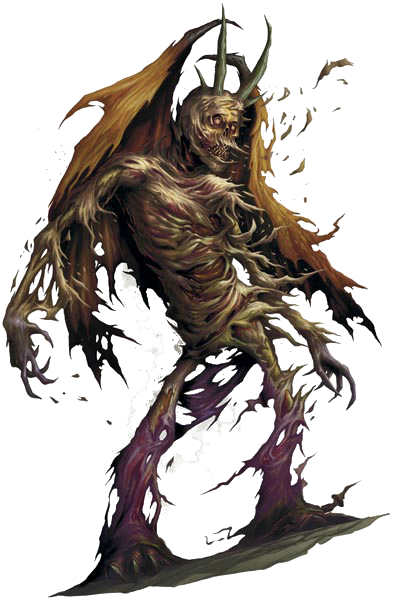
Atropal Scion
Large undead (titan), lawful evil
- Armor Class 9
- Hit Points 114 (12d10 + 48)
- Speed 0 ft., fly 50 ft. (hover)
STR DEX CON INT WIS CHA 16 (+3) 8 (-1) 18 (+4) 18 (+4) 16 (+3) 19 (+4)
- Damage Vulnerabilities radiant
- Damage Resistances bludgeoning, piercing, and slashing from nonmagical attacks
- Damage Immunities cold, necrotic
- Condition Immunities charmed, exhaustion, frightened, poisoned
- Senses darkvision 120 ft., truesight 120 ft., passive Perception 13
- Languages understands Celestial but utters only obscene nonsense
- Challenge 7 (2,900 XP)
Innate Spellcasting. The atropal's innate spellcasting ability is Charisma (spell save DC 15). The atropal can innately cast the following spells, requiring no material components:
At will: dispel magic, toll the dead
3/day: contagionMagic Resistance. The atropal has advantage on saving throws against spells and other magical effects.
Negative Energy Aura. Creatures within 30 feet of the atropal can't regain hit points, and any creature that starts its turn within 30 feet of the atropal takes 7 (2d6) necrotic damage. If the atropal is struck by a vorpal sword, the wielder can cut the atropal's umbilical cord instead of dealing damage. If its umbilical cord is cut, the atropal loses this feature.
Actions
Touch. Melee Weapon Attack: +6 to hit, reach 5 ft., one target. Hit: 10 (3d6) necrotic damage.
Life Drain. The atropal targets one creature it can see within 120 feet of it. The target must make a DC 15 Constitution saving throw, taking 21 (6d6) necrotic damage on a failed save, or half as much damage on a successful one. The atropal regains a number of hit points equal to half the amount of damage dealt.
Summon Specter (Recharge 6). The atropal summons a specter which materializes within 30 feet of it in an unoccupied space it can see. The specter obeys its summoner's commands and can't be controlled by any other creature. The specter vanishes when it drops to 0 hit points or when its summoner dies.
Description
"This creature's hairless, overlarge head surmounts its wet, wrinkled, and bloated humanoid body. Its eyes are glassy and vacant. Its arms are too slender, and its tiny hands end in cruelly sharpened nails, while its legs are atrophied, dead things that hang useless below it."
Atropal scions are clots of divine flesh given form and animation by bleak-hearted gods of death. When a stillborn godling rises spontaneously as an undead, an atropal is born. If that atropal is defeated, but any fragment or cast-off bit of flesh remains, an atropal scion may yet arise from those fragments, lessened in power from its divine beginnings, but no less hateful for its stature.
Unlike normal atropals, atropal scions are imbued with foul magic that grants them a smidgen of spellcasting. Given enough time, an atropal scion may evolve into a threat much greater than the undead it originally splintered off of.
An atropal scion is a power to be reckoned with, and once animate in the world, seeks power over both life and unlife in an unrelenting bid for domination that only its lifeless tissue is able to sustain.
Combat
A soul-numbing cold comes before and follows an atropal scion. The life energy of heroic creatures is suppressed in its foul aura, and the life force of lesser creatures is extinguished. It directs its innate spells and abilities upon those foes its mere presence cannot kill.
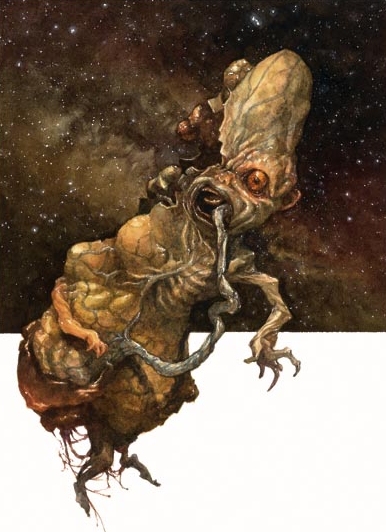
Blaspheme
Medium undead, neutral evil
- Armor Class 16 (natural armor)
- Hit Points 153 (18d8 + 72)
- Speed 30 ft.
STR DEX CON INT WIS CHA 20 (+5) 12 (+1) 18 (+4) 5 (–3) 15 (+2) 10 (+0)
- Saving Throws Wis +5
- Skills Athletics +8, Perception +5, Survival +5
- Damage Immunities cold, necrotic, poison
- Condition Immunities exhaustion, frightened, poisoned, unconscious
- Senses darkvision 60 ft., passive Perception 15
- Languages Common
- Challenge 8 (3900 XP)
Aggressive. As a bonus action, the blaspheme can move up to its speed toward a hostile creature that it can see.
Turn Resistance. The blaspheme has advantage on saving throws against effects that turns undead.
Undead Fortitude. If damage reduces the blaspheme to 0 hit points, it must make a Constitution saving throw with a DC of 5 + the damage taken, unless the damage is radiant or from a critical hit. On a success, the blaspheme drops to 1 hit point instead.
Actions
Multiattack. The blaspheme makes two attacks.
Bite. Melee Weapon Attack: +8 to hit, reach 5 ft., one target. Hit: 16 (2d10 + 5) piercing damage plus 7 (2d6) necrotic damage. If the target is a non-evil creature, it must succeed on a DC 15 Constitution saving throw or have disadvantage on all saving throws until the start of the blaspheme's next turn.
Description
"Appearing similar to a corpse that has been dug up and surgically modified, this creature stands nearly 7 feet tall, but is extraordinarily thin. Its arms are extra long, hanging nearly to mid-calf. Its head is wide and wedge-shaped, with a split mouth that opens wider than that of a normal humanoid. Its teeth glitter like shards of black, steaming ice."
Crafted in bygone days by power-mad wizards searching to create the perfect undead guardians, blasphemes still roam forgotten areas, seeking to destroy nonevil creatures with their blasphemous bite. They are most likely to be encountered near ruins of ancient cities where magic was valued more highly than personal liberty or morals. If the secret of creating or calling a blaspheme into the world still exists, it is buried in just such a location.
Each blaspheme is created with parts from multiple ancient corpses, with teeth specially harvested from sacrifices to evil powers. However, blasphemes are not hulking, slow-moving constructs; rather, they are lithe and deadly, aware of their surroundings and capable of directing their own actions.
Blasphemes stand just under 7 feet tall and weigh about 190 pounds.
Combat
A blaspheme resonates with evil power, the focus of which is concentrated in its teeth. Thus, blasphemes charge into combat in almost every situation, attempting to bite their victims as quickly as possible.
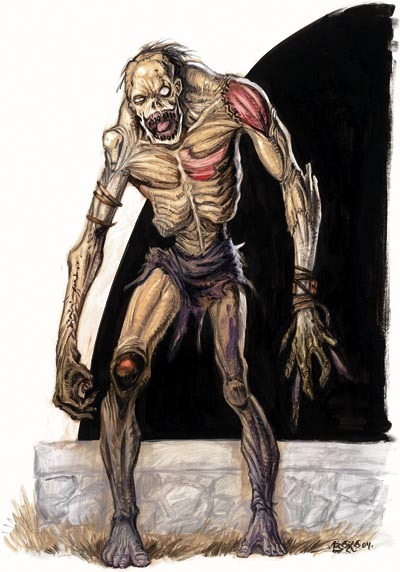
Bleakborn
Medium undead, neutral evil
- Armor Class 14 (natural armor)
- Hit Points 110 (13d8 + 52)
- Speed 30 ft.
STR DEX CON INT WIS CHA 19 (+4) 15 (+2) 18 (+4) 14 (+2) 14 (+2) 15 (+2)
- Saving Throws Con +7
- Damage Resistances cold, necrotic
- Damage Immunities fire, poison
- Condition Immunities exhaustion, poisoned
- Senses darkvision 60 ft., passive Perception 12
- Languages Common, Moilian
- Challenge 6 (2300 XP)
Create Spawn. A humanoid slain by the bleakborn rises as a bleakborn after 1 minute.
Fire Absorption. Whenever the bleakborn is subjected to fire damage, it takes no damage and instead regains a number of hit points equal to the fire damage dealt.
Heat-Draining Aura. At the start of each of the bleakborn's turns, each creature within 30 feet of it takes 7 (2d6) cold damage. The bleakborn regains 5 hit points for each creature damaged by this effect.
Undead Fortitude. If damage reduces the bleakborn to 0 hit points, it must make a Constitution saving throw with a DC of 5 + the damage taken, unless the damage is radiant or from a critical hit. On a success, the bleakborn drops to 1 hit point instead.
Actions
Multiattack. The bleakborn makes two melee attacks.
Chilling Grasp. Melee Weapon Attack: +7 to hit, reach 5 ft., one target. Hit: 22 (4d8 + 4) cold damage.
Description
"This frigid corpse is so cold that it is frosted with icy crystals. Sensing the warmth of life, it shambles eagerly toward its victims. Its eyes reflect the vacuum of the void, its touch chills to the bone, and its very presence seems to drain the heat from your pores."
When inactive, a bleakborn appears to be nothing but a humanoid corpse, slain either by bitterly cold conditions (or if in a warmer environment, as if by a magical cold attack so potent that the corpse still sparkles with ice crystals). However, whenever any living creature comes to within 30 feet of an inactive bleakborn, the warmth and life of the interloper revive the undead creature, giving it purpose and an icy semblance of life.
Bleakborns are also referred to as Moil zombies in some lesser-known tomes about undead, in supposed reference to the cursed city in which they first arose. A bleakborn is not marked by direct violence; rather, it looks like a humanoid that has been flash-frozen, with discoloration and some ruptured flesh showing here and there.
A bleakborn stands a little over 6 feet tall and weighs between 150 and 230 pounds.
Combat
A bleakborn actively moves toward living creatures, attempting to keep them within range of its heat-draining aura. If possible, a bleakborn pummels a living creature with its ice-cold limbs, hoping to deprive its victim of all warmth and life.

Blood Amniote
Huge undead, neutral evil
- Armor Class 8
- Hit Points 171 (18d12 + 54)
- Speed 30 ft., climb 20 ft.
STR DEX CON INT WIS CHA 20 (+5) 6 (–2) 16 (+3) 2 (–4) 6 (–2) 1 (–5)
- Damage Immunities necrotic, poison
- Condition Immunities blinded, charmed, deafened, exhaustion, frightened, poisoned, prone
- Senses blindsight 60 ft. (blind beyond this radius), passive Perception 8
- Languages —
- Challenge 9 (5000 XP)
Amorphous. The blood amniote can move through a space as narrow as 1 inch wide without squeezing.
Self Spawn. When the blood amniote kills a living creature that has blood, it gains 1 hit die, increasing its current and maximum hit points accordingly.
When the blood amniote has gained 18 additional hit dice, it can use its action to split into two regular blood amniotes, each one having 18 hit dice as normal.Actions
Multiattack. The blood amniote makes two melee attacks.
Blood Call. Melee Weapon Attack: +9 to hit, reach 10 ft., one target. Hit: 8 (1d6 + 5) bludgeoning damage plus 21 (6d6) necrotic damage. If the target is a creature that has blood, it must succeed on a DC 15 Constitution saving throw or its hit point maximum is reduced by an amount equal to the damage taken. This reduction lasts until the creature finishes a long rest. The target dies if this effect reduces its hit point maximum to 0.
Description
"A clot of animate blood the size of a small house, this amoeba of failed life is hungry to add new blood to its oozing body."
The half-congealed blood of past victims gives a blood amniote its form, and its ties to the Negative Energy Plane give the creature animation. Mindless, it seeks only to pierce the fleshy carapace of all living creatures it comes upon so it can draw out the blood beneath.
Though these creatures are mindless, vestiges of past victims completely drained of blood remain imprinted on them. Observers sometimes see these random memories as faces that briefly form on the surface of a blood amniote, only to fall away again to formlessness moments later.
Combat
When a blood amniote senses potential prey, it quickly moves to engage, hoping to draw out the blood of its victims in full quantity.
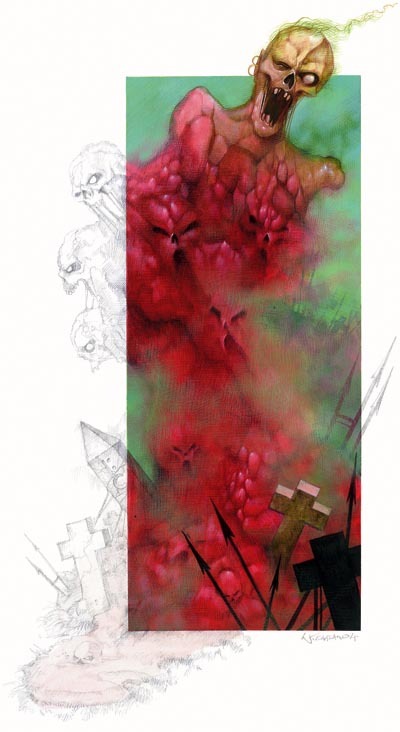
Bloodmote Cloud
Medium swarm of tiny undead, neutral evil
- Armor Class 13 (natural armor)
- Hit Points 39 (6d8 + 12)
- Speed 10 ft., fly 50 ft.
STR DEX CON INT WIS CHA 3 (–4) 14 (+2) 15 (+2) 2 (–4) 8 (–1) 4 (–3)
- Damage Resistances bludgeoning, piercing, slashing
- Damage Immunities poison
- Condition Immunities charmed, frightened, grappled, paralyzed, petrified, poisoned, prone, restrained, stunned
- Senses blindsight 10 ft., darkvision 60 ft., passive Perception 9
- Languages —
- Challenge 6 (2300 XP)
Stench. Any creature that starts its turn with the bloodmote cloud in its space must succeed on a DC 13 Constitution saving throw or be poisoned until the start of its next turn.
Swarm. The swarm can occupy another creature's space and vice versa, and the swarm can move through any opening large enough for a Tiny mosquito. The swarm can't regain hit points or gain temporary hit points.
Actions
Blood Drain. Melee Weapon Attack: +5 to hit, reach 0 ft., one target in the swarm's space. Hit: 10 (4d4) piercing damage plus 5 (2d4) necrotic damage, or 5 (2d4) piercing damage plus 2 (1d4) necrotic damage if the swarm has half of its hit points or fewer.
Description
"This cloud of buzzing insects boils toward its victims, droning ominously in its strangely deep pitch and accompanied by the sickly sweet aroma of blood."
A bloodmote cloud is made up of undead mosquitoes with a blood thirst. While a living mosquito is hardly more than an annoyance, and a swarm of the same is hardly cause for alarm, the appearance of a concentrated swarm of undead bloodsuckers is a calamity.
Combat
A bloodmote cloud seeks to engulf and suck dry any living prey it encounters. A bloodmote cloud is never sated.
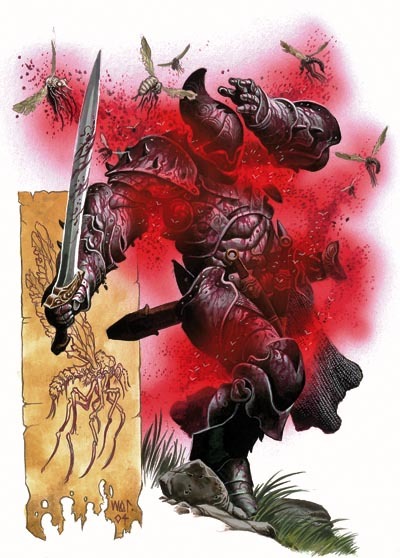
Bone Rat Swarm
Medium swarm of tiny undead, neutral evil
- Armor Class 13
- Hit Points 36 (8d8)
- Speed 15 ft., climb 15 ft.
STR DEX CON INT WIS CHA 9 (–1) 16 (+3) 10 (+0) 2 (–4) 10 (+0) 3 (–4)
- Damage Vulnerabilities bludgeoning
- Damage Resistances piercing, slashing
- Damage Immunities poison
- Condition Immunities charmed, frightened, grappled, paralyzed, petrified, poisoned, prone, restrained, stunned
- Senses darkvision 60 ft., passive Perception 10
- Languages —
- Challenge 3 (700 XP)
Keen Smell. The swarm has advantage on Wisdom (perception) checks that rely on smell.
Swarm. The swarm can occupy another creature's space and vice versa, and the swarm can move through any opening large enough for a Tiny rat. The swarm can't regain hit points or gain temporary hit points.
Actions
Bites. Melee Weapon Attack: +5 to hit, reach 0 ft., one creature in the swarm's space. Hit: 14 (4d6) piercing damage, or 7 (2d6) piercing damage if the swarm has half of its hit points or fewer. The target must make a DC 10 Constitution saving throw, taking 7 (2d6) poison damage on a failed save, or half as much damage on a successful one.
Description
"With the scrabble of hundreds of bony claws, a mass of tiny skeletal creatures surges across the floor, with pinpoints of red light gleaming in their empty eye sockets."
A bone rat swarm is a mass of undead skeletal rats. Though individually such creatures would pose little risk, in great numbers they can strip a creature clean in short order.
Combat
A bone rat swarm seeks to engulf and devour any living prey it encounters.
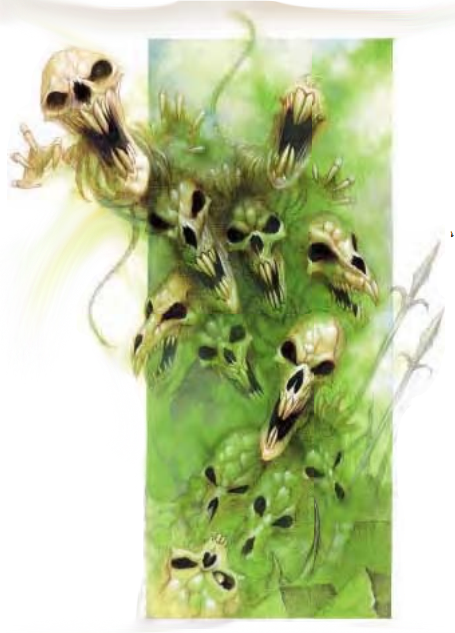
Boneyard
Huge undead, chaotic evil
- Armor Class 15 (natural armor)
- Hit Points 207 (18d12 + 90)
- Speed 40 ft., burrow 40 ft., fly 40 ft.
STR DEX CON INT WIS CHA 20 (+5) 14 (+2) 21 (+5) 16 (+3) 17 (+3) 17 (+3)
- Saving Throws Con +10
- Damage Resistances necrotic
- Damage Immunities cold, poison
- Condition Immunities charmed, exhaustion, frightened, paralyzed, petrified, poisoned, prone, restrained
- Senses tremorsense 60 ft., darkvision 120 ft., passive Perception 13
- Languages Common, Primordial
- Challenge 13 (10000 XP)
Bone Subsumption. When the boneyard deals damage to a creature with bone inside of it, the target must succeed on a DC 16 Constitution saving throw or its hit point maximum is reduced by an amount equal to the damage taken. This reduction lasts until the creature finishes a long rest. The target dies if this effect reduces its hit point maximum to 0.
Summon Minotaur Skeletons (1/Day). As a bonus action, three minotaur skeletons emerge from the body of the boneyard. A skeleton summoned in this way treats the boneyard as its master, and follows its orders to the best of its ability. After 1 hour, the minotaur skeletons are reabsorbed into the boneyard's body.
Actions
Multiattack. The boneyard makes three attacks: two with its bite and one with its tail.
Bite. Melee Weapon Attack: +10 to hit, reach 10 ft., one target. Hit: 14 (2d8 + 5) piercing damage plus 7 (2d6) acid damage.
Tail. Melee Weapon Attack: +11 to hit, reach 15 ft., one target. Hit: 12 (2d6 + 5) bludgeoning damage, and the target is grappled (escape DC 16). Until this grapple ends, the boneyard can't use its tail on another target.
Utter Subsumption. The boneyard makes one tail attack against a Large or smaller target it is grappling. If the attack hits, the target takes an additional 41 (8d8 + 5) bludgeoning damage. If this damage reduces the target to 0 hit points, the boneyard crushes the target, killing it instantly. The target's skeletal features (if any) are then absorbed into the body of the boneyard.
Legendary Actions
The boneyard can take 3 legendary actions, choosing from the options below. Only one legendary action option can be used at a time and only at the end of another creature's turn. The boneyard regains spent legendary actions at the start of its turn.
- Move. The boneyard moves up to its speed.
- Summon Skeletons (Costs 2 Actions). 7 (1d4 + 5) skeletons emerge from the body of the boneyard. These skeletons act on their own initiative count and follow the boneyard's orders to the best of their ability.
Description
"The pile of bones before you stirs. The bones rise and reform, and as each bone finds its proper place, the shape of a huge serpentine creature emerges, one whose form is composed of interlocking bones, its head the skull of some unnamed and long-dead beast."
A boneyard is an undead creature made entirely from the bones of other dead creatures. However, unlike a skeleton or similar monster, a boneyard's form is fluid in the sense that it can appear merely as a pile of bones, or as a serpent composed of bones, or some other form of its choice. Boneyards have been called by many names, depending upon where they are encountered, including bone weirds, dancing bones, and bonetakers.
A boneyard weighs between 4,000 and 8,000 pounds, depending on the number of bones it has subsumed.
Combat
A boneyard seeks to bite and subsume the bones of its foes. If it can grapple a creature using its tail, it pulls it directly into its mass and attempts to kill it with Utter Subsumption as quickly as possible.
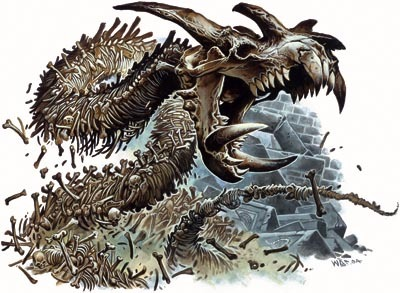
Carcass Eater
Small beast, unaligned
- Armor Class 14 (natural armor)
- Hit Points 16 (3d6 + 6)
- Speed 40 ft., burrow 10 ft.
STR DEX CON INT WIS CHA 15 (+2) 12 (+1) 14 (+2) 3 (–4) 14 (+2) 6 (–2)
- Skills Perception +4, Stealth +3, Survival +4
- Senses darkvision 60 ft., passive Perception 14
- Languages —
- Challenge 1/2 (100 XP)
Blood Frenzy. The carcass eater has advantage on melee attack rolls against any creature that doesn't have all its hit points.
Keen Smell. The carcass eater has advantage on Wisdom (perception) checks that rely on smell.
Actions
Multiattack. The carcass eater makes two attacks: one with its bite and one with its claw.
Bite. Melee Weapon Attack: +4 to hit, reach 5 ft., one target. Hit: 6 (1d8 + 2) piercing damage.
Claw. Melee Weapon Attack: +4 to hit, reach 5 ft., one target. Hit: 5 (1d6 + 2) slashing damage.
Description
"This gore-streaked, four-footed animal seems like a cross between a overlarge rat and a wolf, though even that can't explain the extraordinary size of its toothy jaws."
Carcass eaters are most often found digging up fresh graves for food or, where opportunity is less available, hunting the night for prey.
An adult carcass eater is 3 to 4 feet long and weighs 65 to 75 pounds.
Combat
Carcass eaters attack with their sharp claws and teeth. When it reduces a creature to 0 hit points, it prefers to kill the creature as quickly as possible.
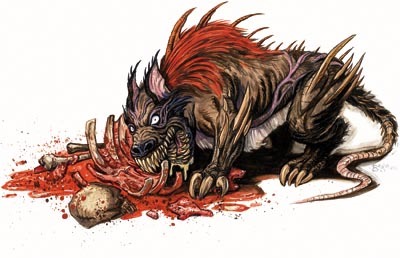
Cinderspawn
Medium undead, chaotic evil
- Armor Class 13
- Hit Points 97 (13d8 + 39)
- Speed 30 ft.
STR DEX CON INT WIS CHA 10 (+0) 17 (+3) 16 (+3) 11 (+0) 12 (+1) 14 (+2)
- Skills Acrobatics +6, Perception +4, Stealth +6
- Damage Immunities fire, poison
- Condition Immunities exhaustion, petrified, poisoned, unconscious
- Senses darkvision 60 ft., passive Perception 14
- Languages Ignan
- Challenge 6 (2300 XP)
Frostfire Shield. A creature that touches the cinderspawn or hits it with a melee attack while within 5 feet of it takes 5 (1d10) cold damage as the cinderspawn drains its body heat.
Illumination. The cinderspawn sheds bright light in a 10-foot radius and dim light for an additional 10 feet.
Water Susceptibility. For every 5 feet the cinderspawn moves in water, or for every gallon of water splashed on it, it takes 1 cold damage.
Actions
Multiattack. The cinderspawn makes two touch attacks. If both attacks hit the same target, the cinderspawn also gains 10 temporary hit points.
Touch. Melee Weapon Attack: +6 to hit, reach 5 ft., one target. Hit: 13 (3d6 + 3) cold damage.
Drain Heat (Recharge 6). The cinderspawn drains the heat of each creature within 15 feet of it. Each creature in that area must make a DC 14 Constitution saving throw, taking 27 (6d8) cold damage on a failed save, or half as much damage on a successful one. If the saving throw fails by 5 or more, a creature also suffers one level of exhaustion.
Sudden Rush. Until the end of the turn, the cinderspawn's speed increases by 60 feet and it doesn't provoke opportunity attacks.
Description
"This tall, gaunt, coal-black humanoid flickers with a blue-white flame. Its bright yellow eyes gleam with menace."
Cinderspawn are burnt-out undead remnants of creatures of elemental fire. They hate living creatures for their warmth and seek to destroy all such beings.
Like a fire elemental, a cinderspawn takes damage from and won't willingly enter a body of water. A body of water is an impassable barrier for a cinderspawn unless the creature can step or jump over it.
Combat
A cinderspawn chooses targets carefully, using its Sudden Rush action to reach vulnerable opponents that might otherwise be protected by comrades.
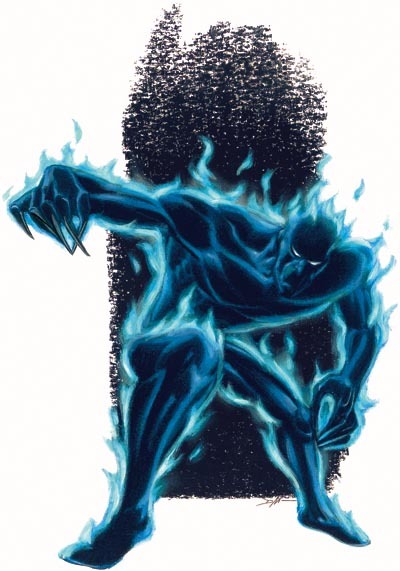
Corpse Rat Swarm
Medium swarm of tiny undead, neutral evil
- Armor Class 14 (natural armor)
- Hit Points 40 (9d8)
- Speed 15 ft., climb 15 ft.
STR DEX CON INT WIS CHA 9 (–1) 16 (+3) 10 (+0) 2 (–4) 10 (+0) 3 (–4)
- Damage Resistances bludgeoning, piercing, slashing
- Damage Immunities poison
- Condition Immunities charmed, frightened, grappled, paralyzed, petrified, poisoned, prone, restrained, stunned
- Senses darkvision 60 ft., passive Perception 10
- Languages —
- Challenge 4 (1100 XP)
Keen Smell. The swarm has advantage on Wisdom (perception) checks that rely on smell.
Swarm. The swarm can occupy another creature's space and vice versa, and the swarm can move through any opening large enough for a Tiny rat. The swarm can't regain hit points or gain temporary hit points.
Undead Fortitude. If damage reduces the swarm to 0 hit points, it must make a Constitution saving throw with a DC of 5 + the damage taken, unless the damage is radiant or from a critical hit. On a success, the swarm drops to 1 hit point instead.
Actions
Bites. Melee Weapon Attack: +5 to hit, reach 0 ft., one creature in the swarm's space. Hit: 14 (4d6) piercing damage, or 7 (2d6) piercing damage if the swarm has half of its hit points or fewer. The target must make a DC 10 Constitution saving throw, taking 7 (2d6) poison damage on a failed save, or half as much damage on a successful one.
Description
"Leaving a stinking trail of blood and rotting entrails, the horde of tiny rat corpses squirms and squeals toward its victims."
Like a bone rat swarm, a corpse rat swarm is made up of countless undead rats. These, however, are closer to zombies than skeletons, with hunks of rotting flesh still hanging on their bones. They are even more disease-ridden than a normal rat swarm, and every bit as hungry for flesh.
Combat
A corpse rat swarm seeks to engulf and devour any living prey it encounters.
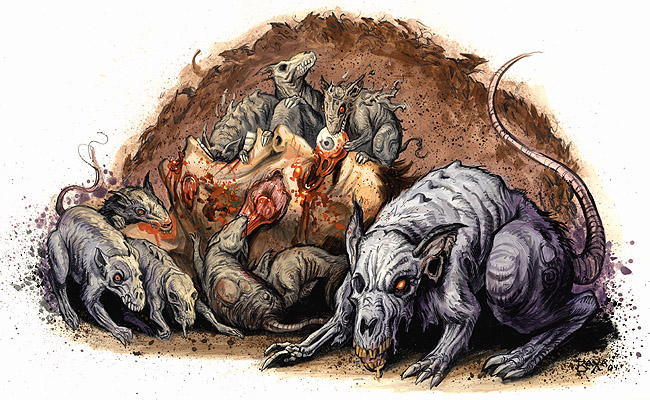
Dire Maggot
Small beast, unaligned
- Armor Class 13 (natural armor)
- Hit Points 44 (8d6 + 16)
- Speed 40 ft., climb 40 ft.
STR DEX CON INT WIS CHA 17 (+3) 12 (+1) 14 (+2) 3 (–4) 14 (+2) 5 (–3)
- Senses darkvision 60 ft., passive Perception 12
- Languages —
- Challenge 2 (450 XP)
Actions
Bite. Melee Weapon Attack: +5 to hit, reach 5 ft., one target. Hit: 10 (2d6 + 3) piercing damage. If the target is a creature, it must succeed on a DC 12 Constitution saving throw or be paralyzed until the end of the maggot's next turn.
Description
"A four-foot-long dead-white segmented worm heaves into view. Eyeless, drooling stinking ichor from its clacking mandibles, the monstrosity resembles nothing so much as a maggot grown orders of magnitude too large."
A maggot is the worm-shaped larva of a fly, but a dire maggot is the larva of similarly monstrous flying vermin. While regular maggots are found in decaying matter, dire maggots are large, quick, and aggressive enough to seek out living prey for nourishment.
Combat
Dire maggots seek to paralyze their prey, though still-squirming prey is just as good to the mindless maggot.

Crypt Chanter
Medium undead, chaotic evil
- Armor Class 14
- Hit Points 90 (12d8 + 36)
- Speed 0 ft., fly 60 ft. (hover)
STR DEX CON INT WIS CHA 6 (–2) 18 (+4) 16 (+3) 13 (+1) 16 (+3) 18 (+4)
- Saving Throws Wis +6
- Skills Deception +7, Insight +6, Stealth +7
- Damage Resistances acid, cold, fire, lightning, thunder; bludgeoning, piercing, and slashing from nonmagical attacks that aren't silvered
- Damage Immunities necrotic, poison
- Condition Immunities charmed, exhaustion, grappled, paralyzed, petrified, poisoned, prone, restrained
- Senses darkvision 60 ft., passive Perception 13
- Languages the languages it knew in life
- Challenge 7 (2900 XP)
Captivating Presence. While the crypt chanter isn't incapacitated, any non-undead creature that starts its turn within 60 feet of the crypt chanter and can hear its melody must make a DC 15 Wisdom saving throw. On a failed save, the creature becomes charmed by the crypt chanter for 1 minute, until the creature is farther than 60 feet away from it, until the crypt chanter is incapacitated or dies, or until the creature becomes deafened. On a successful save, the creature becomes immune to the crypt chanter's Captivating Presence for 24 hours.
Create Spawn. The spirit of a humanoid slain by the crypt chanter rises as a specter after 1 minute. The specter is under the crypt chanter's control.
Incorporeal Movement. The crypt chanter can move through other creatures and objects as if they were difficult terrain. It takes 5 (1d10) force damage if it ends its turn inside an object.
Sunlight Sensitivity. While in sunlight, the crypt chanter has disadvantage on attack rolls, as well as on Wisdom (Perception) checks that rely on sight.
Actions
Draining Melody. Each creature within 60 feet of the crypt chanter that is charmed by it must succeed on a DC 15 Wisdom saving throw or take 14 (4d6) psychic damage and suffer one level of exhaustion.
Life Drain. The crypt chanter targets one creature it can see within 60 feet of it that isn't charmed. The target must succeed on a DC 15 Constitution saving throw, taking 21 (6d6) necrotic damage on a failed save, or half as much damage on a successful one. The crypt chanter regains a number of hit points equal to half the amount of damage dealt.
Legendary Actions
The crypt chanter can take 2 legendary actions, choosing from the options below. Only one legendary action can be used at a time and only at the end of another creature's turn. The crypt chanter regains spent legendary actions at the start of its turn.
- Move. The crypt chanter moves up to half its speed.
- Enthrall. Each creature within 60 feet of the crypt chanter that is charmed by it and can hear its melody must make a DC 15 Wisdom saving throw. On a failed save, a creature takes 7 (2d6) psychic damage and must use its reaction, if available, to move up to its speed towards the crypt chanter.
Description
"A lone, wavering figure begins a song. The haunting melody echoes through the air, calling for you to dance. The music makes your soul shrivel, but it also makes you smile. How can something be so awful and so wonderful at the same time?"
A crypt chanter's voice is the perfect horror, at once compelling and dreadful. These undead creatures sometimes appear to be playing spectral viols, flutes, drums, or any other instruments they choose, varying from chanter to chanter.
Combat
A crypt chanter's strength and shield is its music. A crypt chanter seeks to snare its victims with its music, and then drain them of life with the same melody. If threatened, a crypt chanter retreats into a nearby wall or other handy physical barrier.
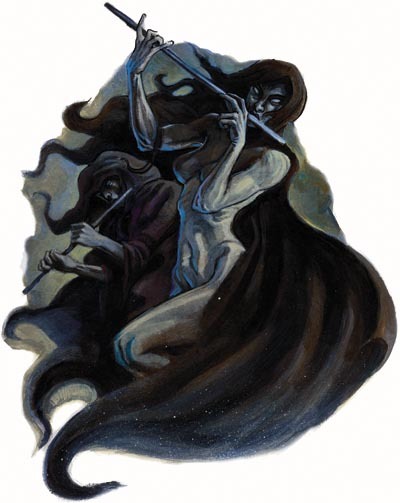
Desiccator
Small undead, neutral evil
- Armor Class 13
- Hit Points 27 (5d6 + 10)
- Speed 20 ft., swim 60 ft.
STR DEX CON INT WIS CHA 9 (–1) 17 (+3) 14 (+2) 8 (–1) 11 (+0) 13 (+1)
- Saving Throws Con +4
- Damage Resistances acid
- Damage Immunities necrotic, poison
- Condition Immunities exhaustion, petrified, poisoned, unconscious
- Senses darkvision 60 ft., passive Perception 10
- Languages Aquan
- Challenge 2 (450 XP)
Aggressive. As a bonus action, the desiccator can move up to its speed toward a hostile creature that it can see.
Actions
Fatiguing Touch. Melee Weapon Attack: +4 to hit, reach 5 ft., one creature. Hit: 10 (2d6 + 3) necrotic damage, and the desiccator gains temporary hit points equal to half the amount of damage dealt.
Desiccating Breath (Recharge 5-6). The desiccator exhales desiccating air in a 15-foot cone. Each creature in that area must make a DC 12 Constitution saving throw, taking 10 (3d6) necrotic damage on a failed save, or half as much damage on a successful one. If the saving throw fails by 5 or more, a creature also gains vulnerability to necrotic damage until the end of the desiccator's next turn unless they have resistance or immunity to such damage.
Description
"This small, salt-encrusted humanoid figure looks parched and gasping. Around it, a dry, hot breeze seems to blow from nowhere."
Desiccators are the dried-out undead remnants of creatures of elemental water. They long to quench their tremendous thirst with the precious fluids of living creatures.
Thanks to their withered forms, desiccators are sometimes mistaken for mummies, although they wear none of the wrappings common to those creatures. Cursed to remain forever bereft of the watery form it had in life, the desiccator envies and despises all living things.
Most desiccators stand about 4 feet tall but weigh only 30 to 40 pounds.
Combat
A desiccator opens combat with its Desiccating Breath, seeking to make opponents vulnerable to its Fatiguing Touch.
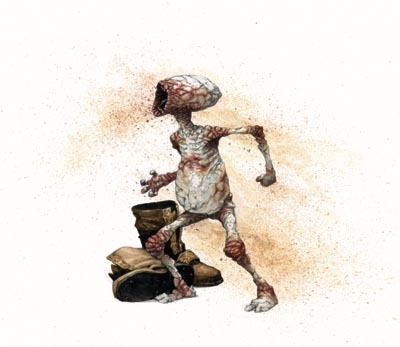
Dream Vestige
Huge undead, chaotic evil
- Armor Class 14
- Hit Points 157 (15d12 + 60)
- Speed 0 ft., fly 60 ft. (hover)
STR DEX CON INT WIS CHA 1 (–5) 18 (+4) 18 (+4) 14 (+2) 16 (+3) 18 (+4)
- Saving Throws Int +7, Wis +8, Cha +9
- Damage Resistances acid, cold, fire, lightning, thunder
- Damage Immunities necrotic, poison; bludgeoning, piercing, and slashing from nonmagical attacks that aren't silvered
- Condition Immunities charmed, exhaustion, frightened, grappled, paralyzed, petrified, poisoned, prone, restrained
- Senses darkvision 120 ft., passive Perception 13
- Languages the languages its victims knew in life
- Challenge 16 (15000 XP)
Desecrating Aura. The vestige emanates an aura of utter desecration out to a range of 30 feet. Non-undead creatures can't regain hit points while within this aura. Additionally, any undead ally of the vestige that is within the aura makes saving throws with advantage, and that ally regains 1d6 hit points whenever it starts its turn there.
Form Consumption. When the vestige kills a living creature, the victim's body is automatically engulfed and dissolved by the dream vestige, and its soul is absorbed and added to the dream vestige's form. The dream vestige gains 1 hit die, increasing its current and maximum hit points accordingly.
When the dream vestige has gained 15 additional hit dice, it can use its action to split into two regular dream vestiges, each one having 15 hit dice as normal.Incorporeal Movement. The vestige can move through other creatures and objects as if they were difficult terrain. It takes 5 (1d10) force damage if it ends its turn inside an object.
Legendary Resistance (3/Day). If the vestige fails a saving throw, it can choose to succeed instead.
Magic Resistance. The vestige has advantage on saving throws against spells and other magical effects.
Actions
Multiattack. The vestige can use its Frightful Presence. It then makes three tendril attacks.
Tendril. Melee Weapon Attack: +9 to hit, reach 10 ft., one target. Hit: 15 (2d10 + 4) necrotic damage.
Etherealness. The vestige magically enters the Ethereal Plane from the Material Plane, or vice versa.
Frightful Presence. Each creature of the vestige's choice that is within 120 feet of the vestige and aware of it must succeed on a DC 17 Wisdom saving throw or become frightened for 1 minute. A creature can repeat the saving throw at the end of each of its turns, ending the effect on itself on a success. If a creature's saving throw is successful or the effect ends for it, the creature is immune to the vestige's Frightful Presence for the next 24 hours.
Legendary Actions
The vestige can take 3 legendary actions, choosing from the options below. Only one legendary action option can be used at a time and only at the end of another creature's turn. The vestige regains spent legendary actions at the start of its turn.
- Move. The vestige moves up to half its speed.
- Nightmare. The vestige targets one frightened creature that it can see within 60 feet of it. The target must make a DC 17 Wisdom saving throw. On a failed save, the target takes 11 (2d10) psychic damage, and the vestige magically learns one fact or secret about the target.
- Disrupt Life (Costs 2 Actions). Each non-undead creature within 30 feet of the vestige must make a DC 17 Constitution saving throw, taking 28 (8d6) necrotic damage on a failed save, or half as much damage on a successful one.
Description
"A mighty river of fog streams forward like an evil waterfall, swollen with storm and spray. Accompanying the shape is a susurrus of dreamlike voices that murmur, cry, and rail against some terrible fate. Slender tendrils of mist extend from the mass, patting and feeling for sustenance."
The original dream vestige was born from the nightmares of an entire city, as all of its citizens died in cursed sleep (a curse that some attribute to Orcus). Since then, that creature has spawned itself many times over.
A dream vestige is a hunter; it hunts for other creatures to incorporate into itself—mind and body, living or undead. Thus, even the undying have cause to fear a dream vestige, which preys on its own. It stalks prey on rooftops, behind walls, or under floors, unseen by its victims. A sudden visceral dread heralds the creature's arrival, at which time the whispers, moans, and lamenting of its subsumed victims becomes audibly apparent.
Combat
A dream vestige uses every ability it has at its disposal to disrupt and crumble the minds and bodies of the living, seeking to draw ever more creatures into itself.

Entomber
Medium undead, lawful evil
- Armor Class 15 (natural armor)
- Hit Points 97 (13d8 + 39)
- Speed 30 ft.
STR DEX CON INT WIS CHA 18 (+4) 12 (+1) 16 (+3) 6 (–2) 12 (+1) 7 (–2)
- Saving Throws Wis +4
- Skills Athletics +7, Perception +4
- Senses darkvision 60 ft., passive Perception 14
- Languages understands Common but can't speak
- Challenge 5 (1800 XP)
Grappler. The entomber has advantage on attack rolls against any creature grappled by it. Additionally, the entomber can use a bonus action to attempt to grapple one creature within its reach.
Turn Resistance. The entomber has advantage on saving throws against effects that turn undead.
Undead Fortitude. If damage reduces the entomber to 0 hit points, it must make a Constitution saving throw with a DC of 5 + the damage taken, unless the damage is radiant or from a critical hit. On a success, the entomber drops to 1 hit point instead.
Actions
Multiattack. The entomber makes two melee attacks.
Slam. Melee Weapon Attack: +7 to hit, reach 5 ft., one target. Hit: 7 (1d6 + 4) bludgeoning damage plus 7 (2d6) necrotic damage.
Entomb. The entomber attempts to bury one creature it is grappling. The target must succeed on a DC 15 Strength saving throw or be pounded bodily into a shallow grave that bulges out of the ground and reveals its location. This ability doesn't work in locations with a basement or open level immediately below, nor can the creature entomb victims in a magical substance or a floor made of solid metal or a similar substance.
While entombed, the creature is blinded, prone, and restrained, and it has total cover. Additionally, the creature is no longer grappled, but it can't breath and is suffocating.
To escape being entombed, the target or a creature within 5 feet of the grave can take an action to attempt to clear away the tomb by making a DC 14 Strength check. After two of these checks succeed (they needn't be consecutive), the target is freed from the tomb, although it remains prone in the same space.Exhume. The entomber touches the top of a grave or space where a creature is buried no deeper than 10 feet. The body immediately rises to the surface via this magic, leaving no hole or tunnel. A body is not harmed when brought to the surface in this manner.
Reactions
Defend Grave. The entomber can attempt to shove one creature that enters its reach.
Description
"This shrunken and disfigured humanoid carcass moves under the power of its own animation, though the details of its shape are blurred beneath a coating of filth and grave dirt."
Entombers are undead animated by necromancers who prefer to leave the dirty work to their servants. The entombers are perfect for putting bodies in the ground, or bringing them out, depending on the needs of their masters. They usually inhabit cemeteries, catacombs, or other places where many corpses might be found. Unless specifically commanded otherwise, entombers treat all living creatures as subjects for their entombing power.
Entombers are filthy, streaked with dirt, and sometimes even bits of desiccated flesh (not their own), jewelry, and other small bits taken from the bodies they exhume or entomb. They stink of both carrion and embalming alchemical fluids. Closer scrutiny reveals their lips are sewn shut.
Most entombers are about 6 feet tall and weigh about 160 pounds.
Combat
In melee combat, an entomber's fist is a powerful weapon. However, the fear associated with entombers is more due to their ability to entomb foes with their attack. Entombers enjoy entombing unconscious foes that have no chance of fighting back, but unless specifically commanded otherwise, entombers treat all living creatures as subjects for their entombing power.

Entropic Reaper
Medium undead, chaotic evil
- Armor Class 15 (natural armor)
- Hit Points 130 (20d8 + 40)
- Speed 30 ft.
STR DEX CON INT WIS CHA 16 (+3) 19 (+4) 14 (+2) 12 (+1) 16 (+3) 18 (+4)
- Saving Throws Dex +8, Con +6, Wis +7
- Skills Acrobatics +8, Perception +7, Stealth +8
- Damage Immunities necrotic, poison
- Condition Immunities charmed, exhaustion, frightened, paralyzed, petrified, poisoned, unconscious
- Senses darkvision 60 ft., passive Perception 17
- Languages Abyssal, Celestial, Common
- Challenge 12 (8400 XP)
Evasion. If the entropic reaper is subjected to an effect that allows it to make a Dexterity saving throw to take only half damage, the entropic reaper instead takes no damage if it succeeds on the saving throw, and only half damage if it fails.
Innate Spellcasting. The entropic reaper's innate spellcasting ability is Charisma (spell save DC 16). It can innately cast the following spells, requiring no material components:
2/day each: dimension door, invisibility (self only)
1/day each: fly, plane shift (self only)Magic Resistance. The entropic reaper has advantage on saving throws against spells and other magical effects.
Magic Weapons. The entropic reaper's weapon attacks are magical.
Shadow Stealth. While in dim light or darkness, the entropic reaper can take the Hide action as a bonus action.
Actions
Multiattack. The entropic reaper makes three melee attacks.
Entropic Scythe. Melee Weapon Attack: +8 to hit, reach 5 ft., one target. Hit: 15 (2d10 + 4) force damage. If the target is a creature, it must make a DC 15 Constitution saving throw. On a failed save, the victim is overwhelmed by searing pain, as its form melts, flows, writhes, and boils. Until the end of the entropic reaper's next turn, the target must subtract a d4 from each of its ability checks and saving throws.
Entropic Bolt. Ranged Spell Attack: +8 to hit, range 120 ft., one target. Hit: 26 (4d10 + 4) force damage.
Legendary Actions
The entropic reaper can take 3 legendary actions, choosing from the options below. Only one legendary action option can be used at a time and only at the end of another creature's turn. The entropic reaper regains spent legendary actions at the start of its turn.
- Teleport. The entropic reaper teleports up to 30 feet to an unoccupied space that it can see.
- Cleave (Costs 2 Actions). The entropic reaper makes a melee attack against each creature within 5 feet of it.
- Mince (Costs 3 Actions). The entropic reaper makes three melee attacks against one target within 5 feet of it. If at least one of the attacks hits, the target must succeed on a DC 16 Wisdom saving throw or be frightened until the end of the entropic reaper's next turn.
Description
"A skeletal being cloaked in a great black robe and head-concealing hood holds a large scythe in both hands. The head of the scythe is an absence in space, a blade-shaped hole in reality that draws in the light around it."
Entropic reapers are undead that arise in Limbo. They enforce the twisted edicts of chaotic beings that decree the death of lawful creatures (though an entropic reaper is not particular about the alignments of the creatures it brings low). Though originating in Limbo, entropic reapers spend much of their time in the Material Plane, seeking to apply their entropic scythes to the necks of the living.
Entropic reapers stand about 6-1/2 feet tall and weigh about 180 pounds.
Combat
An entropic reaper uses its enhanced scythe to wreak terrible damage on those it decides must die (which includes most creatures it happens to meet). It prefers to focus on one target at a time and will attempt to get the jump on them via its stealth-based abilities, but if it has to, it will use its Cleave legendary action to decimate multiple foes at once.

Forsaken Shell
Medium undead, chaotic evil
- Armor Class 15 (natural armor)
- Hit Points 71 (11d8 + 22)
- Speed 30 ft., burrow 15 ft.
STR DEX CON INT WIS CHA 19 (+4) 14 (+2) 15 (+2) 11 (+0) 10 (+0) 10 (+0)
- Skills Acrobatics +5, Stealth +8
- Damage Immunities necrotic, poison
- Condition Immunities charmed, exhaustion, frightened, poisoned, prone, unconscious
- Senses darkvision 60 ft., passive Perception 10
- Languages understands Common but can't speak
- Challenge 6 (2300 XP)
Amorphous. The forsaken shell can move through a space as narrow as 1 inch wide without squeezing. In addition, the forsaken shell can enter a hostile creature's space and stop there.
Create Spawn. The skin of a humanoid slain by the forsaken shell rises as a forsaken shell after 1 minute.
Freedom of Movement. The forsaken shell ignores difficult terrain, and magical effects can't reduce its speed or cause it to be restrained. It can spend 5 feet of movement to escape from nonmagical restraints or being grappled.
Nimble Escape. The forsaken shell can take the Disengage or Hide action as a bonus action on each of its turns.
Actions
Multiattack. The forsaken shell makes two skin slap attacks. If it is grappling a creature, it can also use Constrict.
Skin Slap. Melee Weapon Attack: +7 to hit, reach 0 ft., one target. Hit: 13 (2d8 + 4) bludgeoning damage, and the target is grappled (escape DC 14). While grappled, the target can't speak and is restrained, the forsaken shell's speed is 0, and the forsaken shell is incapable of grappling or attacking any other target.
Constrict. The forsaken shell attempts to constrict one creature it is grappling. The creature must make a DC 15 Strength saving throw, taking 15 (2d10 + 4) bludgeoning damage on a failed save, or half as much damage on a successful one. If the saving throw fails by 5 or more, the creature runs out of breath and begins to suffocate.
Description
"Roiling and coiling, this long, slender creature snakes forward. At first, it does seem like a snake, if strangely wide and loose-skinned, but an instant later the creature is revealed for what it is—an evacuated but horribly animate humanoid skin that continues to slither onward in an unmistakably aggressive manner."
Forsaken shells are what they appear to be—the empty skins of past victims, purged of their bloody and visceral former contents. The loose skins possess an amazing strength and elasticity, driven by necromantic élan and a predatory nature that cannot be denied.
This creature's ability to strip a skin from a victim and animate new versions of itself is terrible enough, but far worse is the accidental discovery of the creature's depredations before uncovering the creature itself. When a forsaken shell skulks into a new area, it seeks to hide the evidence of its predation in out-of-the-way places such as little-opened closets or beneath piles of discarded supplies. Still, sometimes a telltale finger or toe peeking out from the obscuring barrier leads to the discovery of tangled, skinless bodies of fellow friends or family, their dead eyes reflecting their last silent screams.
Forsaken shells weigh about 20 to 30 pounds.
Combat
Forsaken shells are aggressive, but prefer to strike from secret against lone prey. However, even forsaken shells, despite their lack of form, can feel the need to exact vengeance upon someone who has harmed or merely threatened other forsaken shells, especially its spawn. When this happens, they become implacable enemies, willing to attack even large groups of opponents.
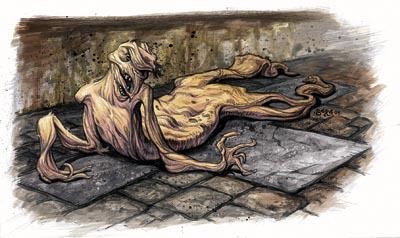
Grave Dirt Golem
Large construct, unaligned
- Armor Class 14 (natural armor)
- Hit Points 133 (14d10 + 56)
- Speed 20 ft.
STR DEX CON INT WIS CHA 20 (+5) 9 (–1) 18 (+4) 3 (–4) 8 (–1) 1 (–5)
- Damage Immunities necrotic, poison, psychic; bludgeoning, piercing, and slashing from nonmagical attacks that aren't adamantine
- Condition Immunities charmed, exhaustion, frightened, paralyzed, petrified, poisoned
- Senses darkvision 60 ft., passive Perception 9
- Languages understands the languages of its creator but can't speak
- Challenge 9 (5000 XP)
Berserk. Whenever the golem starts its turn with 60 hit points or fewer, roll a d6. On a 6, the golem goes berserk. On each of its turns while berserk, the golem attacks the nearest creature it can see. If no creature is near enough to move to and attack, the golem attacks an object, with preference for an object smaller than itself. Once the golem goes berserk, it continues to do so until it is destroyed.
Immutable Form. The golem is immune to any spell or effect that would alter its form.
Magic Resistance. The golem has advantage on saving throws against spells and other magical effects.
Magic Weapons. The golem's weapon attacks are magical.
Negative Energy Absorption. Whenever the golem is subjected to necrotic damage, it takes no damage and instead regains a number of hit points equal to the necrotic damage dealt.
Actions
Multiattack. The golem makes two slam attacks.
Slam. Melee Weapon Attack: +9 to hit, reach 5 ft., one target. Hit: 16 (2d10 + 5) bludgeoning damage. If the target is a creature, it must succeed on a DC 15 Constitution saving throw or have its hit point maximum reduced by an amount equal to the damage taken. This reduction lasts until the creature finishes a long rest. The target dies if this effect reduces its hit point maximum to 0.
Soul Rend (Recharge 5-6). The golem creates a vortex of life-draining energy in a 20-foot radius centered on itself. Each non-undead creature in that area must make a DC 15 Constitution saving throw, taking 22 (4d10) necrotic damage on a failed save, or half as much damage on a successful one. The golem regains hit points equal to half the necrotic damage it deals to each creature.
Description
"Preceded by the smell of carrion, this humanoid creature is formed of moist (almost muddy) earth, mixed in with small bone bits, teeth, and rotting cloth scraps, topped with a dirt-encrusted humanoid skull. Its legs are short and thick, and its chest and arms somewhat tapering."
This humanoid golem is composed of magically coherent grave earth. A grave dirt golem wears no clothing, though sometimes the clothing or the gear of past victims can be found mixed in with the medium of its form.
A grave dirt golem cannot speak or make any vocal noise. It walks and moves with a slow, clumsy gait. It weighs around 800 pounds.
Combat
No one likes to be hit by a grave dirt golem because its filth fouls the wounds of its enemies and reduces their hit point maximums. The golem can regain hit points via its Soul Rend, but once it goes berserk, no known method can re-establish control.
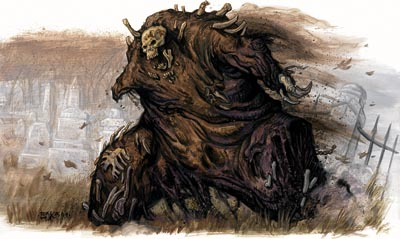
Gravetouched Ghoul
Medium undead, chaotic evil
- Armor Class 15 (Unholy Grace)
- Hit Points 39 (6d8 + 12)
- Speed 30 ft.
STR DEX CON INT WIS CHA 16 (+3) 17 (+3) 14 (+2) 12 (+1) 14 (+2) 15 (+2)
- Saving Throws Str +5, Dex +5, Con +4, Int +3, Wis +4, Cha +4
- Skills Athletics +5, Perception +4, Stealth +5
- Damage Immunities necrotic, poison
- Condition Immunities charmed, exhaustion, frightened, paralyzed, poisoned
- Senses darkvision 120 ft., passive Perception 14
- Languages Common
- Challenge 3 (700 XP)
Cunning Action. On each of its turns, the ghoul can use a bonus action to take the Dash, Disengage, or Hide action.
Turn Resistance. The ghoul has advantage on saving throws against effects that turn undead.
Unholy Grace. The ghoul adds its Charisma modifier to its Armor Class and on saving throws (accounted for in its statistics).
Actions
Multiattack. The ghoul makes two attacks: one with its bite and one with its claws. If the ghoul successfully paralyzes a creature, it can grapple the creature as part of this action.
Bite. Melee Weapon Attack: +5 to hit, reach 5 ft., one target. Hit: 10 (2d6 + 3) piercing damage plus 5 (2d4) necrotic damage. If the target is a non-undead creature, it must succeed on a DC 12 Constitution saving throw or be poisoned until the end of its next turn.
Claws. Melee Weapon Attack: +5 to hit, reach 5 ft., one target. Hit: 8 (2d4 + 3) slashing damage. If the target is a creature other than an elf or undead, it must succeed on a DC 12 Constitution saving throw or be paralyzed for 1 minute. The target can repeat the saving throw at the end of each of its turns, ending the effect on itself on a success.
Description
"This foul humanoid wears a loose shift, but its mottled, decaying flesh is still clearly visible, drawn tightly over bones. Hairless, it has a carnivore's sharp teeth and eyes like hot coals."
Like traditional ghouls, gravetouched ghouls haunt graveyards, battlefields, and other places rich with the carrion for which they hunger. These terrible creatures lurk wherever the stench of death hangs heavy, ready to devour the unwary.
Ghouls are said to be created upon the death of a living sentient being who savored the taste of the flesh of other sentient creatures. This assertion may or may not be true, but it does explain the disgusting behavior of these anthropophagous undead. Some believe that anyone of exceptional debauchery and wickedness runs the risk of becoming a gravetouched ghoul. The transformation from living beings into fell creatures of the night has warped their minds, making them cunning and feral.
While most humanoids who engage in such activities and return from the grave are mere ghouls (as described in the Monster Manual), in rare occasions the creation of a ghoul briefly draws the attention of Doresain, King of the Ghouls. When this happens, the newly formed ghoul does not possess the standard statistics for a ghoul, but instead it becomes a gravetouched ghoul. These gravetouched ghouls are said to be "touched by the King." The DM decides when this occurs.
Combat
This creature attacks with surprise, attempting to paralyze a target and drag it away from its allies before they can react.

Hulking Corpse
Large undead, chaotic evil
- Armor Class 8
- Hit Points 161 (14d10 + 84)
- Speed 30 ft.
STR DEX CON INT WIS CHA 20 (+5) 6 (–2) 22 (+6) 3 (–4) 6 (–2) 5 (–3)
- Saving Throws Str +9, Con +10, Wis +2
- Skills Athletics +9
- Damage Immunities necrotic, poison
- Condition Immunities charmed, exhaustion, frightened, paralyzed, poisoned, stunned, unconscious
- Senses darkvision 60 ft., passive Perception 8
- Languages understands the languages it knew in life but can't speak
- Challenge 9 (5000 XP)
Aggressive. As a bonus action, the hulking corpse can move up to its speed toward a hostile creature that it can see.
Siege Monster. The hulking corpse deals double damage to objects and structures.
Turn Immunity. The hulking corpse is immune to effects that turn undead.
Undead Fortitude. If damage reduces the hulking corpse to 0 hit points, it must make a Constitution saving throw with a DC of 5 + the damage taken, unless the damage is radiant or from a critical hit. On a success, the hulking corpse drops to 1 hit point instead.
Actions
Multiattack. The hulking corpse makes three melee attacks. It then attempts to grapple one creature within its reach.
Slam. Melee Weapon Attack: +9 to hit, reach 5 ft., one target. Hit: 14 (2d10 + 5) bludgeoning damage.
Rend. Melee Weapon Attack: +9 to hit, reach 5 ft., one grappled creature. Hit: 21 (3d10 + 5) slashing damage.
Smash (Recharge 5-6). The hulking corpse bludgeons one target within its reach. The target must make a DC 17 Strength saving throw, taking 38 (6d10 + 5) bludgeoning damage on a failed save, or half as much damage on a successful one. If a creature fails this saving throw by 5 or more, it is also stunned until the end of the creature's next turn.
Description
"Tramping out of the night is a dreadful giant corpse. For all that its eyes are lifeless and devoid of mind, the creature's gaze still promises swift death to any that it can catch and crush in its mighty grip."
Any undead army would be happy to recruit a hulking corpse. Its raw power combined with its mindless devotion to whatever master is powerful enough to command it ensures a swift victory over lesser foes. Of course, few can command a hulking corpse. Thus, these creatures are often found wandering the night, seeking only to crush, destroy, and rend.
Combat
A hulking corpse never employs subtlety or strategy. It bulls in, attempting to grab and rend its foes until they cease moving.
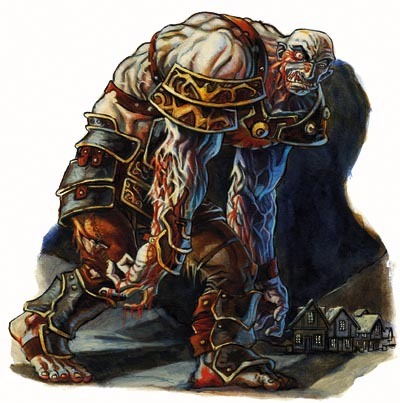
Murk
Medium undead, chaotic evil
- Armor Class 12
- Hit Points 65 (10d8 + 20)
- Speed 0 ft., fly 60 ft. (hover)
STR DEX CON INT WIS CHA 1 (–5) 16 (+3) 14 (+2) 7 (–2) 13 (+1) 14 (+2)
- Damage Resistances acid, cold, fire, lightning, thunder; bludgeoning, piercing, and slashing from nonmagical attacks
- Damage Immunities necrotic, poison
- Condition Immunities charmed, exhaustion, grappled, paralyzed, petrified, poisoned, prone, restrained
- Senses darkvision 60 ft., passive Perception 11
- Languages understands Common but utters only obscene nonsense
- Challenge 3 (700 XP)
Create Spawn. The spirit of a humanoid slain by the murk rises as a murk after 1 minute.
Incorporeal Movement. The murk can move through other creatures and objects as if they were difficult terrain. It takes 5 (1d10) force damage if it ends its turn inside an object.
Sunlight Sensitivity. While in sunlight, the murk has disadvantage on attack rolls, as well as on Wisdom (Perception) checks that rely on sight.
Actions
Life Drain. Melee Weapon Attack: +5 to hit, reach 5 ft., one creature. Hit: 13 (3d6 + 3) necrotic damage. The target must succeed on a DC 12 Constitution saving throw or its hit point maximum is reduced by an amount equal to the damage taken. This reduction lasts until the creature finishes a long rest. The target dies if this effect reduces its hit point maximum to 0.
Spirit Erosion (Recharge 6). The murk draws in the life force of nearby creatures. Each creature within 15 feet of the murk that has half of its hit points or fewer must make a DC 12 Charisma saving throw. On a failed save, a creature suffers one level of exhaustion. If the saving throw fails by 5 or more, the creature also stunned until the start of the murk's next turn.
Description
"The wavering silhouette of a humanoid materializes. Its reaching, half-seen hand threatens to snag your soul."
A murk is an incorporeal, free-roaming blot of undead essence with a nugget of sentience. It exists to spread gloom and, when possible, drain life energy.
Most murks are no more than 6 feet tall.
Combat
Murks haunt tombs, crypts, cemeteries, and other places where undead roam. They enter melee range as fast as possible in order to drain the life of nearby creatures.
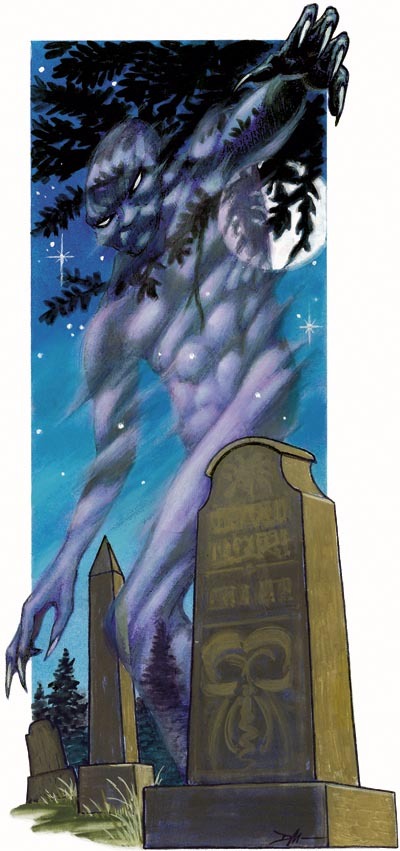
Plague Blight
Medium undead, neutral evil
- Armor Class 15 (natural armor)
- Hit Points 110 (13d8 + 52)
- Speed 30 ft.
STR DEX CON INT WIS CHA 18 (+4) 12 (+1) 19 (+4) 12 (+1) 15 (+2) 14 (+2)
- Saving Throws Con +7
- Skills Deception +5, Perception +5
- Damage Immunities necrotic, poison
- Condition Immunities exhaustion, poisoned
- Senses darkvision 60 ft., passive Perception 15
- Languages the languages it knew in life
- Challenge 6 (2300 XP)
Foul. The plague blight can activate or deactivate this feature as a bonus action. While active, any creature that starts its turn within 10 feet of the plague blight must succeed on a DC 15 Constitution saving throw or be poisoned until the start of the creature's next turn.
Poison Absorption. Whenever the plague blight is subjected to poison damage, it takes no damage and instead regains a number of hit points equal to the poison damage dealt.
Undead Fortitude. If damage reduces the plague blight to 0 hit points, it must make a Constitution saving throw with a DC of 5 + the damage taken, unless the damage is radiant or from a critical hit. On a success, the plague blight drops to 1 hit point instead.
Actions
Multiattack. The plague blight makes two melee attacks.
Gangrenous Touch. Melee Weapon Attack: +7 to hit, reach 5 ft., one creature. Hit: 18 (4d6 + 4) necrotic damage. The target must succeed on a DC 15 Constitution saving throw or become diseased, and the target's skin becomes putrescent and gangrenous. While diseased, the target can't regain hit points, and at the end of every minute, the target must succeed on a DC 15 Constitution saving throw or have its maximum hit points be reduced by 4 (1d8). The disease can only be removed by greater restoration or a disease-curing spell of 5th level or higher, but when a lesser restoration or protection from poison spell is cast on the target, the saving throws against the disease are paused for 1 hour.
The target dies if this effect reduces its hit point maximum to 0. If this happens, the target's corpse sloughs into a brittle, stinking mass of putrescent ruin that molders to nothing over the course of 24 hours, unless gentle repose or similar magic is cast on the corpse.
Description
"Soft and putrescent, this creature's form is wrapped in tight circles of cloth, though bloated, swollen tissue still seeps through. The odor of this creature goes beyond the stink of carrion; the putrefaction of its body is like a physical force that moves before it."
Plague blights are animated corpses of humanoids who died from plague or rot. In undeath, they seek to putrefy all that is pure. They are wily and may attempt to trick their victims into allowing themselves get close enough to touch.
Combat
In melee combat, the stench of a plague blight sickens its opponents. Far worse is its touch, which brings on a terrible wasting disease in its victims, rotting the flesh in seconds and sending tendrils of dead flesh ever inward toward the heart.
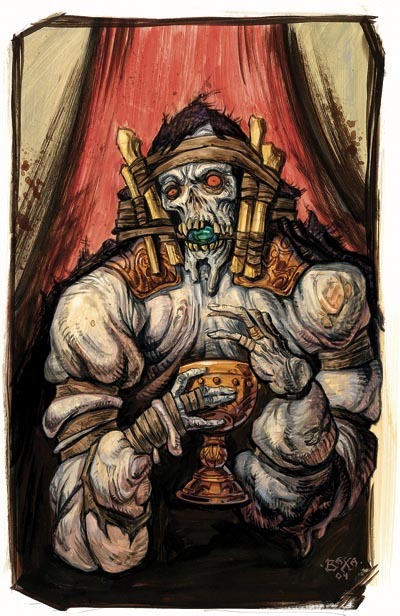
Quell
Medium undead, lawful evil
- Armor Class 13
- Hit Points 65 (10d8 + 20)
- Speed 0 ft., fly 60 ft. (hover)
STR DEX CON INT WIS CHA 1 (−5) 16 (+3) 14 (+2) 12 (+1) 13 (+1) 16 (+3)
- Damage Resistances acid, cold, fire, lightning, thunder; bludgeoning, piercing, and slashing from nonmagical attacks that aren't silvered
- Damage Immunities necrotic, poison
- Condition Immunities charmed, exhaustion, grappled, paralyzed, petrified, poisoned, prone, restrained
- Senses darkvision 60 ft., passive Perception 11
- Languages the languages it knew in life
- Challenge 3 (700 XP)
Godhate. The quell has advantage on saving throws against divine spells, which are spells cast by clerics, paladins, druids, rangers, celestials, and other sources the DM deems appropriate.
Incorporeal Movement. The quell can move through other creatures and objects as if they were difficult terrain. It takes 5 (1d10) force damage if it ends its turn inside an object.
Sense Divinity. The quell knows if a visible creature is a celestial or a user of divine magic (a cleric, paladin, druid, ranger, or some other class the DM deems appropriate).
Sunlight Sensitivity. While in sunlight, the quell has disadvantage on attack rolls, as well as on Wisdom (Perception) checks that rely on sight.
Actions
Multiattack. The quell uses its Intercession if it is available, and then it uses its Life Drain.
Life Drain. Melee Weapon Attack: +5 to hit, reach 5 ft., one creature. Hit: 16 (3d8 + 3) necrotic damage. The target must succeed on a DC 13 Constitution saving throw or its hit point maximum is reduced by an amount equal to the damage taken. This reduction lasts until the target finishes a long rest. The target dies if this effect reduces its hit point maximum to 0.
Intercession (Recharge 5-6). Each creature within 45 feet of the quell that is a celestial or a user of divine magic (a cleric, paladin, druid, ranger, or some other class the DM deems appropriate) must make a DC 13 Wisdom saving throw. On a failed save, a target cannot cast spells via divine magic until the start of the quell's next turn. If the saving throw fails by 5 or more, this effect instead lasts until the target finishes a long rest.
Description
"Two fiery green eyes glare from a shrouded, half-real visage of this vaguely humanoid shade. Either it is dressed in robes, or its ectoplasmic flesh is naturally loose and flowing. Dark symbols hang in the air just above and about its form, free-standing glyphs that viscerally demonstrate the creature's anathema to all things divine."
Quells are incorporeal creatures of malevolence and the night. They despise all living things, as well as the light that nurtures them, but the urge that truly drives them is their hatred of those who serve deities.
If they could, quells would commit deicide, though of course such actions are far beyond a quell's power. However, while a quell cannot directly affect a deity, it does have a power over the connection between a deity and its followers.
Because of their powers, quells are sought out by bands of more powerful undead or necromancers.
Combat
Quells attack directly in combat. Their true power lies in their ability to break connections between clerics and their deities.
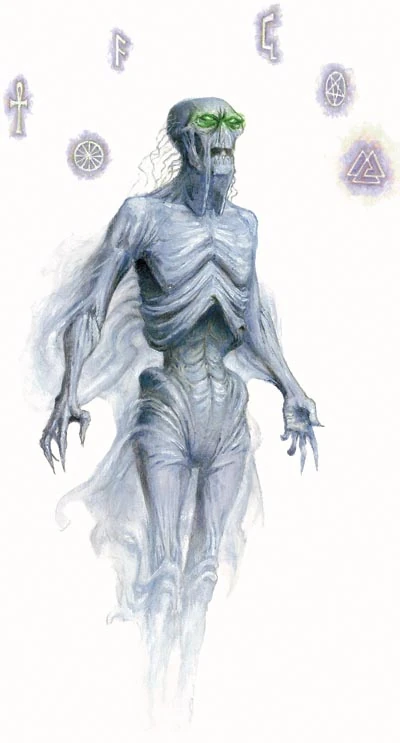
Raiment
Small undead, chaotic evil
- Armor Class 15 (natural armor)
- Hit Points 13 (3d6 + 3)
- Speed 20 ft.
STR DEX CON INT WIS CHA 16 (+3) 14 (+2) 13 (+1) 1 (–5) 9 (–1) 7 (–2)
- Saving Throws Dex +4, Wis +1
- Skills Athletics +5
- Damage Vulnerabilities fire
- Damage Immunities necrotic, poison, psychic
- Condition Immunities charmed, exhaustion, frightened, paralyzed, petrified, poisoned, unconscious
- Senses blindsight 60 ft. (blind beyond this radius), passive Perception 9
- Languages understands Common but can't speak
- Challenge 1 (200 XP)
Asphyxiate. The raiment deals double damage to any creature it is grappling.
Boneless. The raiment can move through and occupy a space as narrow as 2 inches wide without squeezing. In addition, the raiment can enter a hostile creature's space and stop there.
Evasion. If the raiment is subjected to an effect that allows it to make a Dexterity saving throw to take only half damage, the raiment instead takes no damage if it succeeds on the saving throw, and only half damage if it fails.
False Appearance. While the raiment remains motionless, it is indistinguishable from a normal set of clothing.
Actions
Constrict. Melee Weapon Attack: +5 to hit, reach 0 ft., one target. Hit: 10 (2d6 + 3) bludgeoning damage, and the target is grappled (escape DC 14). Until this grapple ends, the creature is restrained, the target can't speak or breathe, and the raiment can't constrict another target. If this attack is a critical hit, the target is also blinded by the raiment until the grapple ends.
Description
"An empty set of clothing, dingy and stained, flings itself forward, seemingly eager to reach you."
A raiment is the clothing of a victim of some atrocious crime, animated by the spirit of the vengeful victim, mindlessly intent on using its only remaining tool to cause as much pain and suffering as its long-missing flesh felt in death.
The clothing sometimes retains other personal belongings of its former owners as well. Different raiments may appear in different styles of dress, but most require a sufficient mass of clothing to give them a shape and the ability to wrap their sleeves around the necks of prospective victims.
Combat
A raiment sometimes lies quiescent, like a pile of cast-off rags, attacking only when its victims are close enough to surprise.
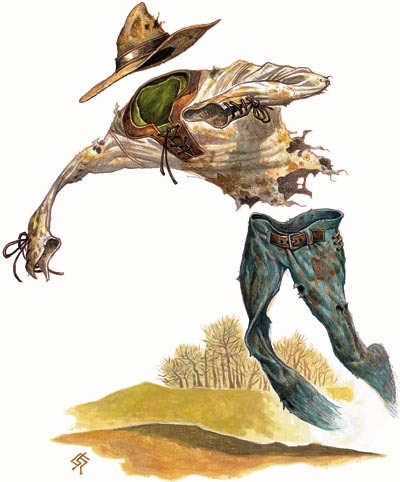
Skin Kite
Small undead, neutral evil
- Armor Class 16 (natural armor)
- Hit Points 33 (6d6 + 12)
- Speed 10 ft., fly 40 ft.
STR DEX CON INT WIS CHA 18 (+4) 16 (+3) 14 (+2) 6 (–2) 12 (+1) 7 (–2)
- Skills Acrobatics +5, Stealth +5
- Damage Immunities poison
- Condition Immunities exhaustion, frightened, poisoned
- Senses darkvision 60 ft., passive Perception 11
- Languages understands the languages it knew in life but can't speak
- Challenge 3 (700 XP)
Damage Transfer. While attached to a creature, the skin kite takes only half the damage dealt to it (rounded down), and that creature takes the other half.
Actions
Slam. Melee Weapon Attack: +6 to hit, reach 5 ft., one creature. Hit: 7 (2d6 + 4) bludgeoning damage, and if the target is Large or smaller, the skin kite attaches to it. If the skin kite has advantage against the target, the skin kite attaches to the target's head, and the target is blinded and unable to breathe while the skin kite is attached. While attached, the skin kite can make this attack only against the target and has advantage on the attack roll. The skin kite can detach itself by spending 5 feet of its movement. A creature, including the target, can take its action to detach the skin kite by succeeding on a DC 14 Strength check.
Meld. If the skin kite is attached to a creature, that creature must make a DC 14 Constitution saving throw. On a failed save, the target takes 10 (3d6) necrotic damage, and the skin kite regains hit points equal to half the damage dealt. On a failed save of 5 or more, the skin kite absorbs a portion of the target's skin; the skin kite gains the Launch Kite action and can use it once during the next minute.
Launch Kite (Available via Meld). The skin kite can use this action to spawn a new skin kite using skin stolen via the Meld action. The skin kite must take this action at the start of its turn, and its speed is reduced to 0 for the rest of the turn. This action provokes opportunity attacks from creatures that can reach the skin kite.
The freshly launched skin kite has a number of hit points equal to the original's current total and acts immediately after the original skin kite on the same initiative.
Description
"A knot of flaccidly flapping membranes kites through the air, now drifting with the currents, now stooping swiftly through the air toward you."
Skin kites are undead creatures made up of the stolen skin of past victims. They feed on the skin of living beings, replenishing their own constantly rotting skin, as well as using new skin as spawning material for new skin kites.
No two skin kites appear the same. They display a range of different colors, depending on the creatures from which they were harvested. Many skin kites have rotting clumps of hair or fur, unintended additional trophies from past victims.
A skin kite has no body, only a wingspan, which is about 5 feet. It weighs about 5 pounds.
Combat
A skin kite attacks by landing on a victim and melding a portion of its undead membrane with its victim's skin. After using Meld to absorb a target's skin, the skin kite attempts to Disengage and retreat to a safe location where it can use Launch Kite without provoking opportunity attacks.
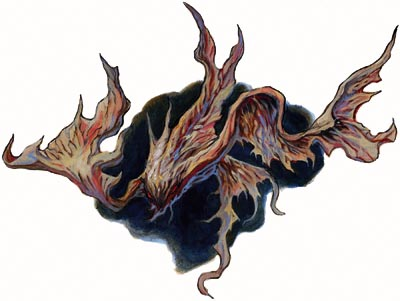
Skirr
Huge undead, neutral evil
- Armor Class 16 (natural armor)
- Hit Points 168 (16d12 + 64)
- Speed 20 ft., fly 50 ft.
STR DEX CON INT WIS CHA 20 (+5) 16 (+3) 18 (+4) 2 (–4) 11 (+0) 8 (–1)
- Saving Throws Dex +6, Con +7
- Skills Perception +3, Stealth +6
- Damage Immunities necrotic, poison
- Condition Immunities charmed, exhaustion, frightened, poisoned
- Senses darkvision 60 ft., passive Perception 13
- Languages —
- Challenge 7 (2900 XP)
Flyby. The skirr doesn't provoke opportunity attacks when it flies out of an enemy's reach.
Actions
Multiattack. The skirr makes two attacks: one with its bite and one with its claw.
Bite. Melee Weapon Attack: +8 to hit, reach 5 ft., one target. Hit: 18 (3d8 + 5) piercing damage. If the target is a Large or smaller creature, it is grappled (escape DC 15), and the skirr can't bite another target.
Claw. Melee Weapon Attack: +8 to hit, reach 5 ft., one target. Hit: 15 (3d6 + 5) slashing damage.
Description
"A faint whirring sound and the stench of death precedes a great shape scudding through the air. The creature has a humanoid form with the skull of a long-toothed bull. Its upper arms are great wings, and its lower legs end in cruel, clawed talons. No skin or fur can be seen beneath the dingy gray funerary wrappings that cover the entire creature like a mummy."
Skirrs are predators that hunt the edges of necropolises, great expanses of deadly swamps, deserts, or other places where victims might be found alone, hurt, and pressed by dangers from directions other than the sky. That's when skirrs swoop in to attack.
Skirrs measure, wingtip-to-wingtip, 50 feet or more, and weigh about 20,000 pounds.
Combat
Skirrs are predators that scavenge the bodies of those killed by sudden stops. Their favored tactic is to swoop down, grab a victim, ascend to a height of at least 200 feet, and then drop the victim in a deadly fall.
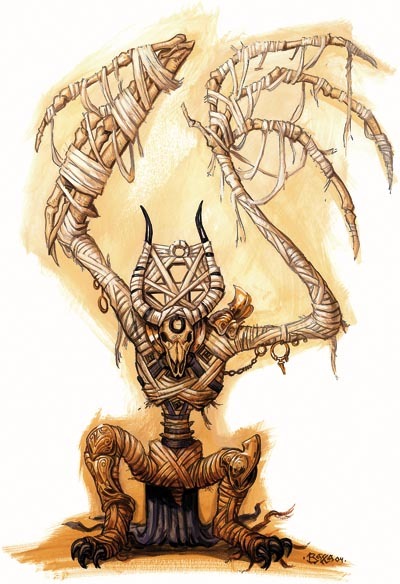
Skulking Cyst
Small undead, chaotic evil
- Armor Class 15 (natural armor)
- Hit Points 39 (6d6 + 18)
- Speed 30 ft., climb 30 ft., swim 30 ft.
STR DEX CON INT WIS CHA 9 (–1) 18 (+4) 16 (+3) 13 (+1) 14 (+2) 16 (+3)
- Skills Perception +4, Stealth +6
- Damage Immunities necrotic, poison
- Condition Immunities blinded, charmed, deafened, exhaustion, frightened, paralyzed, petrified, poisoned
- Senses blindsight 60 ft. (blind beyond this radius), passive Perception 14
- Languages —
- Challenge 4 (1100 XP)
Create Spawn. A creature slain by the skulking cyst's Blood Drain rises as a skulking cyst after 1 minute. If a creature dies while suffering from a necrotic cyst spell originating from the skulking cyst, a skulking cyst bursts from the creature's body and acts on the same turn that it emerges.
Damage Transfer. While attached to a creature, the skulking cyst takes only half the damage dealt to it (rounded down), and that creature takes the other half.
Innate Spellcasting. The skulking cyst's innate spellcasting ability is Charisma (spell save DC 13, +5 to hit with spell attacks). It can innately cast the following spells, requiring no components:
1/day each: darkness, contagion, necrotic cyst (see "Actions" below)
Spider Climb. The skulking cyst can climb difficult surfaces, including upside down on ceilings, without needing to make an ability check.
Standing Leap. The skulking cyst's long jump is up to 30 feet and its high jump is up to 15 feet, with or without a running start.
Undead Fortitude. If damage reduces the skulking cyst to 0 hit points, it must make a Constitution saving throw with a DC of 5 + the damage taken, unless the damage is radiant or from a critical hit. On a success, the skulking cyst drops to 1 hit point instead.
Actions
Blood Drain. Melee Weapon Attack: +6 to hit, reach 5 ft., one target. Hit: 11 (2d6 + 4) piercing damage plus 5 (2d4) necrotic damage, and if the target is not a construct or undead, the skulking cyst attaches to it. If the skulking cyst has advantage against the target, it attaches to the target's head, and the target is blinded and unable to breathe while the skulking cyst is attached. While attached, the cyst can make this attack only against the target and has advantage on the attack roll. The skulking cyst can detach itself by spending 5 feet of its movement. A creature, including the target, can take its action to detach the skulking cyst by succeeding on a DC 14 Strength check.
Necrotic Cyst (5th-Level Spell; 1/Day). Melee Spell Attack: +5 to hit, reach 5 ft., one creature. Hit: The target develops an internal spherical sac that contains fluid or semisolid necrotic flesh, unless it is a construct or undead. The internal cyst is noticeable as a slight bulge on the target's arm, abdomen, or face (wherever the skulking cyst chose to touch the target), and is buried deeply enough in its flesh that it is not easily identifiable without a successful DC 13 Wisdom (Medicine) check.
While the target possesses a necrotic cyst, it suffers from the poisoned condition, and it can't magically regain hit points or benefit from resistance to necrotic damage. Additionally, whenever the target takes damage, it must make a DC 13 Constitution saving throw. On a failed save, the target's hit point maximum is reduced by an amount equal to the damage taken. This reduction lasts until the creature finishes a long rest. The target dies if this effect reduces its hit point maximum to 0.
A protection from evil and good spell prevents the necrotic cyst from forming, but once a necrotic cyst is implanted, it can only be removed can be removed only by heal or another disease-curing spell of 6th level or higher. The target may also elect to have some well-meaning chirurgeon remove it surgically. The procedure is a bloody, painful process that has a chance to kill the target if done improperly. The procedure takes 1 hour, and the chirurgeon must make a DC 13 Wisdom (Medicine) check. On a success, the cyst is removed safely, and the target suffers one level of exhaustion. On a failure, the target dies.
Description
"The horrible creature walking into view is a mass of free-roaming intestines, flaccid organs, and a few odd rib bones. Dragging behind it like a dead weight is a lolling, maggot-ridden humanoid head."
A skulking cyst is disgorged from the rotting corpse of a living creature, born of a necrotic cyst that eventually kills its host (see the necrotic cyst spell).
A skulking cyst prefers shadows and dark corners, only revealing the horror of its form when it strikes lone victims from hiding. Though often cloaked in the detritus of a previous victim, the skulking cyst's true "heart" is a 1-foot-diameter spherical sac that contains fluid and semisolid necrotic flesh, which slowly undulates as if in a mockery of breath.
Combat
A creature of shadows, a skulking cyst prefers to launch attacks on lone victims from dark ceilings and sewer grates.

Slaughter Wight
Medium undead, neutral evil
- Armor Class 16 (Unholy Grace)
- Hit Points 68 (8d8 + 32)
- Speed 40 ft.
STR DEX CON INT WIS CHA 18 (+4) 16 (+3) 18 (+4) 13 (+1) 15 (+2) 17 (+3)
- Saving Throws Str +7, Dex +6, Con +7, Int +4, Wis +5, Cha +6
- Skills Perception +5, Stealth +6
- Damage Resistances bludgeoning, piercing, and slashing from nonmagical attacks that aren't silvered
- Damage Immunities cold, necrotic, poison
- Condition Immunities charmed, exhaustion, frightened, paralyzed, poisoned
- Senses darkvision 60 ft., passive Perception 15
- Languages the languages it knew in life
- Challenge 8 (3900 XP)
Aura of Death. As long as the slaughter wight is not incapacitated, hostile creatures within 5 feet of it gain vulnerability to necrotic damage unless they have resistance or immunity to such damage.
Sunlight Sensitivity. While in sunlight, the slaughter wight has disadvantage on attack rolls, as well as on Wisdom (Perception) checks that rely on sight.
Unholy Grace. The slaughter wight adds its Charisma modifier to its Armor Class and on saving throws (accounted for in its statistics).
Actions
Multiattack. The slaughter wight makes two fist attacks or two longbow attacks. It can use its Life Drain in place of one fist attack.
Fist. Melee Weapon Attack: +7 to hit, reach 5 ft., one target. Hit: 8 (1d8 + 4) bludgeoning damage plus 9 (2d8) necrotic damage.
Life Drain. Melee Weapon Attack: +7 to hit, reach 5 ft., one creature. Hit: 13 (2d8 + 4) necrotic damage. The target must succeed on a DC 15 Constitution saving throw or its hit point maximum is reduced by an amount equal to the damage taken. This reduction lasts until the target finishes a long rest. The target dies if this effect reduces its hit point maximum to 0.
A humanoid slain by this attack rises 24 hours later as a wight under the slaughter wight's control, unless the humanoid is restored to life or its body is destroyed. The slaughter wight can have no more than six wights under its control at one time.
Description
"A slender, wiry corpse moves toward you, supernatural agility obvious in its motions. Its leathery, desiccated flesh ripples across its body, tolerant of the creature's quick movements despite being lifeless parchment."
Slaughter wights are undead that have been specially touched by a malevolent force that took an interest in them, endowing them with a vicious hatred of life that goes beyond that of normal wight or other undead. A slaughter wight's appearance is an exaggerated and horrifying effigy of the form it had in life.
Though sometimes found lurking in barrows, more often slaughter wights skulk through the nighttime streets of large cities seeking to fulfill an order or contract on a living human target. After all, slaughter wights make exceptional assassins.
A slaughter wight is about the height and weight of a human.
Combat
Slaughter wights are deadly combatants, not only because of their supernaturally strong blows and ability to drain life from their foes, but also because their Aura of Death makes even the toughest of opponents vulnerable to their Life Drain attacks.
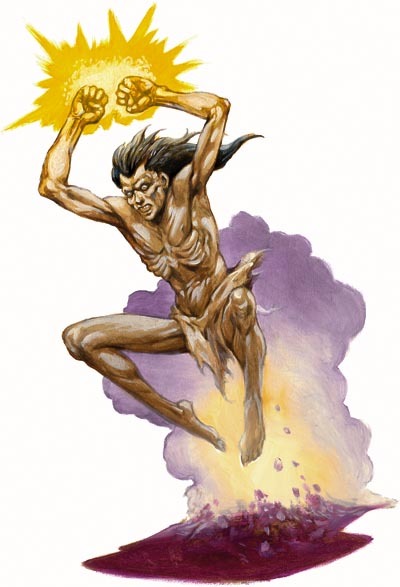
Slaymate
Small undead, lawful evil
- Armor Class 13
- Hit Points 27 (6d6 + 6)
- Speed 30 ft.
STR DEX CON INT WIS CHA 8 (–1) 16 (+3) 12 (+1) 11 (+0) 10 (+0) 13 (+1)
- Skills Stealth +5
- Damage Immunities poison
- Condition Immunities poisoned
- Senses darkvision 60 ft., passive Perception 10
- Languages the languages it knew in life
- Challenge 2 (450 XP)
Nimble Escape. The slaymate can take the Disengage or Hide action as a bonus action on each of its turns.
Sneak Attack (1/Turn). The slaymate deals an extra 7 (2d6) damage when it hits a target with a melee weapon attack and has advantage on the attack roll, or when the target is within 5 feet of an ally of the slaymate that isn't incapacitated and the slaymate doesn't have disadvantage on the attack roll.
Actions
Bite. Melee Weapon Attack: +5 to hit, reach 5 ft., one creature. Hit: 5 (1d4 + 3) piercing damage plus 7 (2d6) necrotic damage. The target must succeed on a DC 11 Constitution saving throw or be poisoned until the end of its next turn.
Knife. Melee Weapon Attack: +5 to hit, reach 5 ft., one target. Hit: 5 (1d4 + 3) piercing damage. If this attack hits while the slaymate is invisible, it is automatically a critical hit.
Invisibility. The slaymate and any Huge or smaller creature it is riding magically turns invisible until either creature makes an attack roll, makes a damage roll, or casts a spell, or until the slaymate's concentration ends (as if concentrating on a spell). Any equipment the slaymate or its rider wears or carries is invisible with it.
Description
"This pale creature resembles a human child with slug-white skin. Its black eyes are too knowing for their size, and its too-wide mouth is home to rot and ruin."
Slaymates are undead creatures given a semblance of life when a guardian's betrayal, either outright or through negligence, leads to death. A slaymate's appearance is a weird and twisted reflection of the form it had in life.
Slaymates are highly prized by necromancers, and thus are rarely encountered alone, but instead are found in the presence of evil spellcasters and others who dabble in necromancy. Many a slaymate can be found riding, papoose style, on the back of a necromancer who values the slaymate's special abilities.
A slaymate is about the height and weight of an eight-year-old human child.
Combat
Slaymates prefer to attack from the shadows, preferably on the back of a necromancer guardian if it has one. When forced to fight, the slaymate prefers to use its disease-laden bite, or a small knife if provided with one.
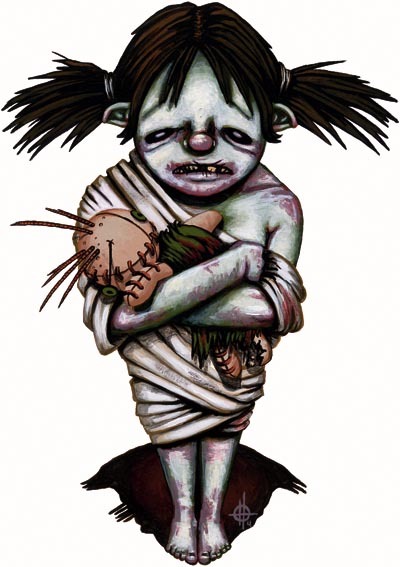
Spectral Lyrist
Medium undead, chaotic evil
- Armor Class 12
- Hit Points 67 (9d8 + 27)
- Speed 0 ft., fly 60 ft. (hover)
STR DEX CON INT WIS CHA 6 (–2) 15 (+2) 16 (+3) 12 (+1) 14 (+2) 16 (+3)
- Saving Throws Wis +4
- Skills Deception +7, Perception +4, Performance +5
- Damage Resistances acid, cold, fire, lightning, thunder; bludgeoning, piercing, and slashing from nonmagical attacks that aren't silvered
- Damage Immunities necrotic, poison
- Condition Immunities charmed, exhaustion, grappled, paralyzed, petrified, poisoned, prone, restrained
- Senses darkvision 60 ft., passive Perception 14
- Languages the languages it knew in life
- Challenge 4 (1100 XP)
Incorporeal Movement. The spectral lyrist can move through other creatures and objects as if they were difficult terrain. It takes 5 (1d10) force damage if it ends its turn inside an object.
Innate Spellcasting. The spectral lyrist's innate spellcasting ability is Charisma (spell save DC 13). It can innately cast the following spells, requiring no material components:
At will: disguise self, minor illusion, vicious mockery (5th level) 2/day each: enthrall, suggestion
1/day each: charm person, phantasmal forceSunlight Sensitivity. While in sunlight, the spectral lyrist has disadvantage on attack rolls, as well as on Wisdom (Perception) checks that rely on sight.
Taunt (2/Day). The spectral lyrist can use a bonus action on its turn to target one creature within 30 feet of it. If the target can hear the spectral lyrist, the target must succeed on a DC 13 Charisma saving throw or have disadvantage on ability checks, attack rolls, and saving throws until the start of the spectral lyrist's next turn.
Actions
Life Drain. Melee Weapon Attack: +4 to hit, reach 5 ft., one target. Hit: 12 (3d6 + 2) necrotic damage. The target must succeed on a DC 13 Constitution saving throw or its hit point maximum is reduced by an amount equal to the damage taken. This reduction lasts until the creature finishes a long rest. The target dies if this effect reduces its hit point maximum to 0.
Description
"A smiling, brightly clothed figure stands before you."
In life, a spectral lyrist used its powers of performance and persuasion to further the cause of evil and strife, whether by urging listeners to commit violence or simply luring the innocent to their deaths. Cursed to forever walk the earth, it blames those still alive for its undead state and seeks to commit even greater evils against them.
A spectral lyrist can appear as any Medium humanoid, and it doesn't share the insubstantial or diaphanous appearance of other incorporeal creatures when so disguised. A lyrist is weightless, regardless of appearance.
Combat
A spectral lyrist uses its ability to bluff and change its appearance to present itself as a friendly creature, putting victims at ease until it can use its spells on them.
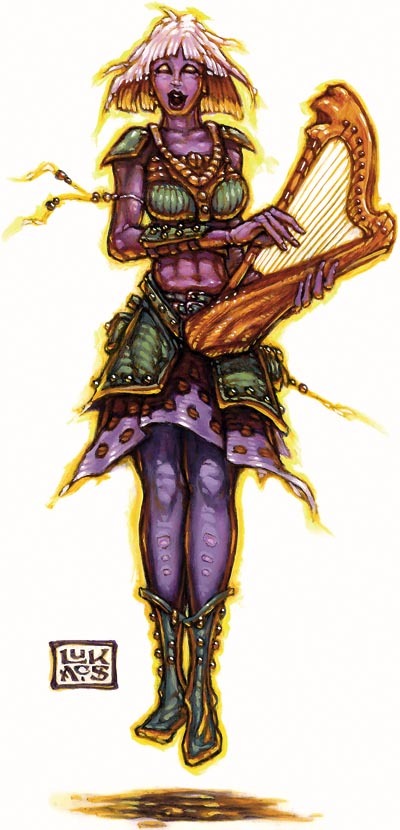
Tomb Mote
Tiny undead, chaotic evil
- Armor Class 12
- Hit Points 7 (2d4 + 2)
- Speed 40 ft.
STR DEX CON INT WIS CHA 5 (–3) 14 (+2) 13 (+1) 8 (–1) 12 (+1) 6 (–2)
- Skills Stealth +4
- Damage Resistances necrotic, poison
- Condition Immunities poisoned
- Senses darkvision 60 ft., passive Perception 11
- Languages —
- Challenge 1/8 (25 XP)
Nimble Escape. The tomb mote can take the Disengage or Hide action as a bonus action on each of its turns.
Actions
Bite. Melee Weapon Attack: +4 to hit, reach 5 ft., one target. Hit: 4 (1d4 + 2) piercing damage. If the target is a creature, it must make a DC 11 Constitution saving throw. On a failed save, the target is poisoned until the end of the tomb mote's next turn. On a successful save, the target is immune to being poisoned by any tomb mote for 24 hours.
Description
"These tiny, vaguely humanoid creatures are animated accumulations of tomb litter—shards of bone, lone teeth, matted hair, bits of shattered tombstone, and grave dirt."
Tomb motes sometimes spontaneously arise in graveyards with a high concentration of buried magic, undead activity, and/or mass burials. As accumulations of grave detritus, tomb motes are surprisingly smart and vicious.
Tomb motes weigh 5 to 8 pounds and measure no more than 1 foot in height.
Combat
Tomb motes typically attack from ambush due to their size. If possible, they attempt to attack a foe en masse.
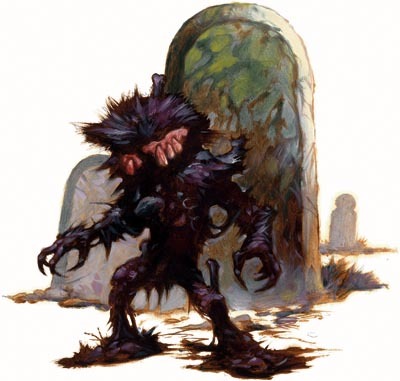
Tombstone Golem
Large construct, unaligned
- Armor Class 17 (natural armor)
- Hit Points 178 (17d10 + 85)
- Speed 30 ft.
STR DEX CON INT WIS CHA 22 (+6) 9 (–1) 20 (+5) 3 (–4) 11 (+0) 1 (–5)
- Saving Throws Str +10, Con +9, Cha –1
- Damage Immunities necrotic, poison, psychic; bludgeoning, piercing, and slashing from nonmagical attacks that aren't adamantine
- Condition Immunities charmed, exhaustion, frightened, paralyzed, petrified, poisoned
- Senses darkvision 120 ft., passive Perception 10
- Languages understands the languages of its creator but can't speak
- Challenge 12 (8400 XP)
Immutable Form. The golem is immune to any spell or effect that would alter its form.
Magic Resistance. The golem has advantage on saving throws against spells and other magical effects.
Magic Weapons. The golem's weapon attacks are magical.
Negative Energy Absorption. Whenever the golem is subjected to necrotic damage, it takes no damage and instead regains a number of hit points equal to the necrotic damage dealt.
Actions
Multiattack. The golem makes two slam attacks.
Slam. Melee Weapon Attack: +10 to hit, reach 5 ft., one target. Hit: 19 (3d8 + 6) bludgeoning damage.
Disrupt Life (Recharge 5-6). Each non-undead creature within 10 feet of the golem must make a DC 17 Constitution saving throw against this magic, taking 21 (6d6) necrotic damage on a failed save, or half as much damage on a successful one. If the saving throw fails by 5 or more, a creature also suffers one level of exhaustion.
Description
A stone golem becomes a tombstone golem with the following substitutions. Rather than simple stone, the creature is made up of fused grave headstones, inscribed with names in various languages, often more than one name per headstone, along with birth and death dates. Second, its supernatural ability to slow opponents is replaced by the Disrupt Life ability.
Visage
Medium undead, chaotic evil
- Armor Class 14
- Hit Points 78 (12d8 + 24)
- Speed 30 ft., fly 60 ft. (hover)
STR DEX CON INT WIS CHA 6 (–2) 19 (+4) 14 (+2) 15 (+2) 12 (+1) 18 (+4)
- Saving Throws Dex +8, Wis +5
- Skills Deception +12, Insight +5, Perception +5, Stealth +8
- Damage Resistances acid, cold, fire, lightning, thunder; bludgeoning, piercing, and slashing from nonmagical attacks
- Damage Immunities necrotic, poison
- Condition Immunities exhaustion, frightened, paralyzed, petrified, poisoned
- Senses darkvision 60 ft., passive Perception 15
- Languages the languages it knew in life
- Challenge 9 (5000 XP)
Assume Identity. The visage can use its action to polymorph into a Small or Medium humanoid it has killed within the last week, or back into its true form. Its statistics, other than its size, are the same in each form. Any equipment it is wearing or carrying isn't transformed. It reverts to its true form if it dies.
Create Spawn. An aberration, celestial, fey, or fiend slain by the visage rises as a visage after 1 minute.
Innate Spellcasting. The visage's innate spellcasting ability is Charisma (spell save DC 16, +8 to hit with spell attacks). It can innately cast the following spells, requiring no material components:
At will: minor illusion, toll the dead
3/day each: darkness, finger of death
2/day each: charm person, suggestion
1/day each: dominate person, phantasmal forceShadow Stealth. While in dim light or darkness, the visage can take the Hide action as a bonus action.
Actions
Mutiattack. The visage makes two melee attacks.
Claw. Melee Weapon Attack: +8 to hit, reach 5 ft., one target. Hit: 7 (1d6 + 4) slashing damage plus 10 (3d6) necrotic damage.
Description
"This creature appears only somewhat solid, with a mostly shapeless body. Its only definite features include a pale, white, masklike face bearing a perpetual grin and a pair of particularly long and nasty claws."
The visage is a devious undead creature that steals the identity of its victims to further its chaotic and evil aims. The first visages were formed from the spirits of demons by Orcus, Demon Prince of Undead, while he had assumed the identity of Tenebrous. When he reassumed his true identity and mantle, however, Orcus discarded the visages from his service, and since that time, they have reproduced by spawning new visages from any evil outsiders.
Though a visage appears incorporeal, it does not actually possess that quality. A visage isn't very dense, though, and only weighs about 75 pounds despite its size. In its normal form, it is sometimes mistaken for a wraith.
Combat
Visages prefer subterfuge to overt combat, since their physical attacks aren't very threatening. They use their dominate person and lucidity control abilities to influence weak-willed individuals, hoping to draw them to places where they can finish them off secretly and assume their identities. Then, the visage uses this new identity to sow chaos and discord as long as possible.
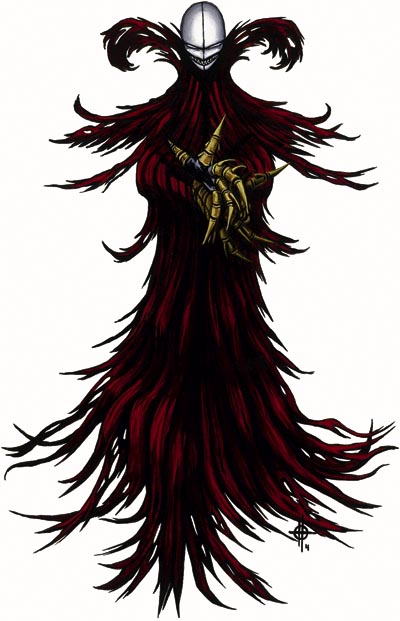
Voidwraith
Large undead, neutral evil
- Armor Class 15
- Hit Points 75 (10d10 + 20)
- Speed 0 ft., fly 90 ft. (hover)
STR DEX CON INT WIS CHA 14 (+2) 20 (+5) 14 (+2) 6 (–2) 10 (+0) 6 (–2)
- Damage Resistances acid, cold, fire, lightning, thunder; bludgeoning, piercing, and slashing from nonmagical attacks that aren't silvered
- Damage Immunities necrotic, poison
- Condition Immunities charmed, exhaustion, grappled, paralyzed, petrified, poisoned, prone, restrained, unconscious
- Senses darkvision 60 ft., passive Perception 10
- Languages Auran
- Challenge 6 (2300 XP)
Airless Aura. A voidwraith's body is surrounded by an aura of near vacuum at all times. Breathing creatures within 15 feet of the voidwraith have no air to breathe and must hold their breath. Whenever such a creature takes damage, it must make a DC 13 Constitution saving throw. On a failed save, the creature begins suffocating. If the creature is already suffocating, it instead loses one of the rounds that it has to reach air before dropping to 0 hit points.
Incorporeal Movement. The voidwraith can move through other creatures and objects as if they were difficult terrain. It takes 5 (1d10) force damage if it ends its turn inside an object.
Steal Breath. When a creature within 15 feet of the voidwraith is reduced to 0 hit points, the voidwraith gains 5 temporary hit points, and the creature runs out of breath if it hadn't already.
Vacuum. Creatures within 15 feet of the voidwraith must spend 2 feet of movement for every 1 foot they move away from the voidwraith.
Actions
Touch. Melee Weapon Attack: +8 to hit, reach 5 ft., one target. Hit: 23 (4d8 + 5) necrotic damage.
Description
"This creature appears to be a formless cloud of darkness, broken only by two pinpoints of glowing red. A breeze blows toward it, as if it were drawing air into its body."
A voidwraith is an undead manifestation of elemental air. It hungers for the breath of the living.
Voidwraiths vaguely resemble wraiths in their appearance, but are more amorphous and cloudlike. Still, they share the wraith's hatred for all living things.
A voidwraith fills an area roughly 5 feet on a side, with cloudlike tendrils reaching beyond that. As an incorporeal creature, a voidwraith has no weight.
Combat
A voidwraith lurks in dark places until it can sweep out and attack a living victim. Thanks to its stealth and speed, it often surprises targets.

Wheep
Medium undead, lawful evil
- Armor Class 14 (natural armor)
- Hit Points 150 (20d8 + 60)
- Speed 30 ft.
STR DEX CON INT WIS CHA 20 (+5) 12 (+1) 16 (+3) 6 (–2) 14 (+2) 17 (+3)
- Damage Vulnerabilities psychic
- Damage Resistances necrotic; bludgeoning, piercing, and slashing from nonmagical attacks
- Damage Immunities poison
- Senses blindsight 60 ft. (blind beyond this radius), passive Perception 12
- Languages the languages it knew in life
- Challenge 11 (7200 XP)
Eternal Sorrow. When the wheep takes psychic damage, the wheep shrieks loudly in pain. Each non-undead creature that can hear this shriek takes the same damage that the wheep does.
Poison Tears. The poison tears that continually pour from a wheep's empty eyes are actually an injury poison that coats the wheep's claws and fills its mouth. Whenever the wheep hits a creature with a melee weapon attack, the creature must succeed on a DC 15 Constitution saving throw or become vulnerable to poison damage for 1 hour. The target is immune to this effect if it is immune to being poisoned.
Weeping Dirge. At the start of each of its turns, the wheep can choose to spend the round crying and blubbering. Each non-undead creature that can hear the wheep's awful, grave-born sorrow must make a DC 15 Wisdom saving throw. On a failed save, a creature has disadvantage on attack rolls and ability checks until the start of the wheep's next turn. On a successful save, a creature is immune to this wheep's Wheeping Durge for 24 hours.
Actions
Multiattack. The wheep makes three attacks: one with its bite and two with its claws.
Bite. Melee Weapon Attack: +9 to hit, reach 5 ft., one target. Hit: 9 (1d8 + 5) piercing damage plus 10 (3d6) poison damage.
Claw. Melee Weapon Attack: +9 to hit, reach 5 ft., one target. Hit: 8 (1d6 + 5) slashing damage plus 10 (3d6) poison damage.
Description
"The empty orbs of this wizened corpse leak a vile, black ichor that streaks the creature's face and body, coating its clawed limbs. As the ichor runs into the creature's mouth, it bubbles and pops, so that its constant wailing emerges as a gurgling keen."
Wheeps are undead servants of more powerful unliving lords, usually serving as bodyguards but sometimes sent on missions to procure from guarded cemeteries the remains of particularly powerful and trusted figures. Their average size belies a powerful undead strength, fueled by their undying sorrow.
Eyeless, a wheep is in constant pain, sniffling and crying aloud unless it is trying to hide or move silently. From its hollow eye sockets, a wheep continuously produces a poison with the appearance of black bile. It is easy to track wheeps that have passed through an area in the last hour, because they leave behind a trail of their poisonous tears. After an hour, the bile decomposes and evaporates.
A wheep stands nearly 6 feet tall and weighs about 200 pounds.
Combat
Those close enough to hear a wheep's cries may be taken aback, but they are likely to be far more threatened by the creature's poison-coated claws and maw.
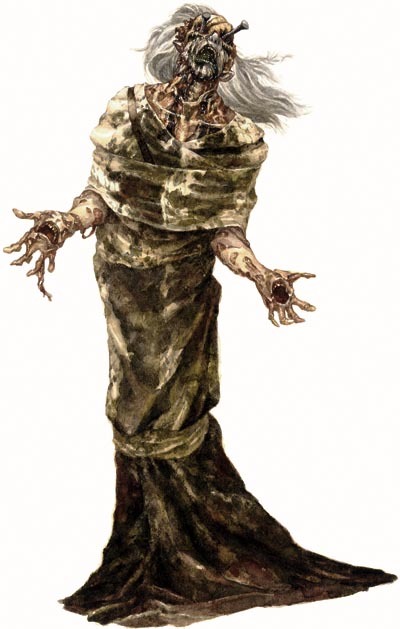
Templates
Ghost Brute Template
Ghost brutes are the spectral remnants of animals, magical beasts, and sentient plants- creatures without enough Intelligence to become normal ghosts. They drift aimlessly, haunting the places where they died and moaning in endless misery.
A ghost brute most often results from the same circumstances that caused its earthly companion or master to remain after death. It might be the mount of a betrayed paladin, the beloved pet of a child tragically killed, the scorched oak of a ghostly dryad, or a murdered druid's animal companion. In most cases, laying the associated being to rest also puts an end to the ghost brute.
However, sometimes a bizarre circumstance might produce a ghost brute without an intelligent companion. For example, a forest suddenly obliterated by an evil magical attack might remain as a ghostly grove populated by lingering spirits not even completely aware of their own destruction.
Only an unaligned beast or plant can become a ghost brute, although the DM may allow creatures of other alignments to become ghost brutes as appropriate. When a living creature (referred to as the base creature) is transformed into a ghost brute, it retains its statistics except as described below.
Type. The ghost brute is an undead, and it doesn't require air, food, drink, or sleep.
Armor Class. The ghost brute's Armor Class becomes 10 + its Dexterity modifier if it wasn't already, and it loses natural armor or any other source of armor it may have had.
Speed. The ghost brute's walking speed is set to 0, and it loses all other forms of movement. It then gains a magical flying speed of 40 feet, and it can hover.
Ability Score Adjustment. The ghost brute's Charisma score is set to its Strength or Dexterity score (whichever is higher). Its Strength score is then halved, to a minimum of 1.
Damage Vulnerabilities, Resistances, and Immunities. The ghost brute has the same vulnerabilities, resistances, and immunities as a ghost (MM 147). None of the vulnerabilities, resistances, or immunities from the base creature are preserved.
Condition Immunities. The ghost brute can't be charmed, frightened, grappled, paralyzed, petrified, poisoned, prone, or restrained. It also doesn't suffer from exhaustion.
Senses. The ghost brute gains darkvision out to 60 feet. If the base creature already had darkvision, the radius of its darkvision instead increases by 60 feet. However, if the base creature has blindsight and is blind beyond its radius, the ghost brute does not gain darkvision.
Traits, Actions, and Proficiencies. The ghost brute loses any trait, such as Amphibious, that assumes a living physiology, as well as any trait that relies on being corporeal, such as Spider Climb or Standing Leap. The ghost brute might retain or lose any or all of its lair actions or inherit new ones, as the DM sees fit. It also gains additional actions and traits as described in the template's statistics block. Otherwise, the ghost brute retains the base creature's proficiencies, actions, and traits.
Ghost Brute Template
[Base size] undead, unaligned
- Armor Class 10 + its Dexterity modifier
- Hit Points base
- Speed 0 ft., fly 40 ft. (hover)
STR DEX CON INT WIS CHA Base/2 Base Base Base Base See Template
- Saving Throws base
- Skills base
- Damage Resistances acid, fire, lightning, thunder; bludgeoning, piercing, and slashing from nonmagical attacks
- Damage Immunities cold, necrotic, poison
- Condition Immunities base + charmed, exhaustion, frightened, grappled, paralyzed, petrified, poisoned, prone, restrained
- Senses base + darkvision 60 ft., passive Perception [base]
- Languages the languages it knew in life
- Challenge base
Additional Traits
Ethereal Sight. The ghost brute can see 60 feet into the Ethereal Plane when it is on the Material Plane, and vice versa.
Incorporeal Movement. The ghost brute can move through other creatures and objects as if they were difficult terrain. It takes 5 (1d10) force damage if it ends its turn inside an object.
Withering Touch. The ghost brute's attacks deal necrotic damage instead of their normal damage type.
Additional Actions
Etherealness. The ghost brute enters the Ethereal Plane from the Material Plane, or vice versa. It is visible on the Material Plane while it is in the Border Ethereal, and vice versa, yet it can't affect or be affected by anything on the other plane.
Bloodcurling Howl (Recharge 6). The mournful howling of the ghost brute chills the living to the core. Each non-undead creature within 30 feet of the ghost brute that can hear it must succeed on a Wisdom saving throw (DC 8 + the ghost brute's proficiency bonus + its Charisma modifier) or be frightened for 1 minute. A frightened target can repeat the saving throw at the end of each of its turns, ending the effect on itself on a success. If a target's saving throw is successful or the effect ends for it, the target is immune to this ghost brute's Bloodcurling Howl for the next 24 hours.
Ghost Hound
Medium undead, unaligned
- Armor Class 12
- Hit Points 11 (2d8 + 2)
- Speed 0 ft., fly 40 ft. (hover)
STR DEX CON INT WIS CHA 6 (–2) 15 (+2) 12 (+1) 3 (–4) 12 (+1) 15 (+2)
- Skills Perception +3, Stealth +4
- Damage Resistances acid, fire, lightning, thunder; bludgeoning, piercing, and slashing from nonmagical attacks
- Damage Immunities cold, necrotic, poison
- Condition Immunities charmed, exhaustion, frightened, grappled, paralyzed, petrified, poisoned, prone, restrained
- Senses darkvision 60 ft., passive Perception 13
- Languages —
- Challenge 1/4 (50 XP)
Ethereal Sight. The ghost hound can see 60 feet into the Ethereal Plane when it is on the Material Plane, and vice versa.
Incorporeal Movement. The ghost hound can move through other creatures and objects as if they were difficult terrain. It takes 5 (1d10) force damage if it ends its turn inside an object.
Keen Hearing and Smell. The ghost hound has advantage on Wisdom (Perception) checks that rely on hearing or smell.
Pack Tactics. The ghost hound has advantage on an attack roll against a creature if at least one of the ghost hound's allies is within 5 feet of the creature and the ally isn't incapacitated.
Actions
Withering Bite. Melee Weapon Attack: +4 to hit, reach 5 ft., one target. Hit: 7 (2d4 + 2) necrotic damage.
Etherealness. The ghost hound enters the Ethereal Plane from the Material Plane, or vice versa. It is visible on the Material Plane while it is in the Border Ethereal, and vice versa, yet it can't affect or be affected by anything on the other plane.
Bloodcurling Howl (Recharge 6). The mournful howling of the ghost hound chills the living to the core. Each non-undead creature within 30 feet of the ghost hound that can hear it must succeed on a DC 12 Wisdom saving throw or be frightened for 1 minute. A frightened target can repeat the saving throw at the end of each of its turns, ending the effect on itself on a success. If a target's saving throw is successful or the effect ends for it, the target is immune to this ghost hound's Bloodcurling Howl for the next 24 hours.
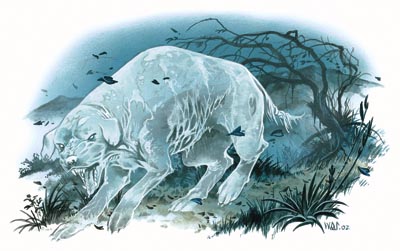
Half-Vampire Template
In rare circumstances, a vampire that has recently consumed a significant quantity of blood gains the ability to breed successfully with a humanoid, creating half-vampire offspring. Also, in the unusual case of a pregnant humanoid who barely survives a vampire's bite attack, the child may be born "tainted" by the attacker's vampirism. Regardless of the origin, the children produced by such events are typically branded as outcasts, welcome neither among the living or the undead.
A half-vampire is drawn to other living creatures, and feels far more comfortable when living in towns or cities. Still, half-vampires know that they must keep their identities secret or else risk the hatred and violence of others
Half-vampires are often physically attractive and persuasive. Their skin is pale, even ashen in color.
Unlike their undead forebears, half-vampires enjoy the freedom (or curse) of pursuing any alignment, though most tend toward neutrality or evil. Those rare few good-aligned half-vampires often feel haunted by their heritage, sometimes working to undo the evil of their ancestry.
Only a humanoid can be born as a half-vampire, although the DM may allow creatures of other types to be half-vampires as appropriate. When a living creature (referred to as the base creature) is born as a half-vampire, it retains its statistics except as described below.
Ability Score Adjustment. The half-vampire's Charisma score increases by 2, to a maximum of 22.
Damage Vulnerabilities, Resistances, and Immunities. The half-vampire gains resistance to necrotic damage.
Senses. The half-vampire gains darkvision out to 60 feet. If the base creature already had darkvision, the radius of its darkvision instead increases by 60 feet. However, if the base creature has blindsight and is blind beyond its radius, the half-vampire does not gain darkvision.
Traits, Actions, and Proficiencies. The half-vampire might retain or lose any or all of its lair actions or inherit new ones, as the DM sees fit. It also gains additional actions and traits as described in the template's statistics block. Otherwise, the half-vampire retains the base creature's proficiencies, actions, and traits.
Half-Vampire Template
[Base size] humanoid (base, half-vampire), [base alignment]
- Armor Class base
- Hit Points base
- Speed base
STR DEX CON INT WIS CHA Base Base Base Base Base Base + 2
- Saving Throws base
- Skills base
- Damage Vulnerabilities base
- Damage Resistances base + necrotic
- Damage Immunities base
- Condition Immunities base
- Senses base + darkvision 60 ft., passive Perception [base]
- Languages base
- Challenge [recalculate]
Additional Traits
Regeneration. The half-vampire regains 10 hit points at the start of its turn if it has at least 1 hit point and isn't in sunlight or running water. If the half-vampire takes radiant damage or damage from holy water, this trait doesn't function at the start of the half-vampire's next turn.
Sunlight Sensitivity. While in sunlight, the half-vampire has disadvantage on attack rolls, as well as on Wisdom (Perception) checks that rely on sight.
Additional Actions
Multiattack. The half-vampire makes two claw attacks. It can substitute one of these attacks with a bite attack.
Bite. If the base creature already has a Bite action, the half-vampire can keep it. Otherwise, this attack uses the half-vampire's Strength modifier to determine its attack bonus and damage. This attack deals piercing damage to one target that is grappled by the half-vampire, incapacitated, or restrained. The damage dice of the attack is equal to one of the half-vampire's hit dice.
The target also takes necrotic damage equal to two of the half-vampire's hit dice. The target's hit point maximum is reduced by an amount equal to the necrotic damage taken, and the vampire regains hit points equal to that amount. The reduction lasts until the target finishes a long rest. The target dies if this effect reduces its hit point maximum to 0.Claws. If the base creature already has a Claw or Claws action, the half-vampire can keep it. Otherwise, this attack uses the half-vampire's Strength modifier to determine its attack bonus and damage. This attack deals slashing damage to one target, with its damage dice being equal to one of the half-vampire's hit dice. Instead of dealing damage, the half-vampire can grapple the target (escape DC 10 + the half-vampire's Strength modifier).
Charm. The half-vampire targets one humanoid it can see within 30 feet of it. If the target can see the half-vampire, the target must succeed on a Wisdom saving throw (DC 8 + the half-vampire's proficiency bonus + its Charisma modifier) against this magic or be charmed by the half-vampire. The charmed target regards the half-vampire as a trusted friend to be heeded and protected. Although the target isn't under the half-vampire's control, it takes the half-vampire's requests or actions in the most favorable way it can.
If the half-vampire or the half-vampire's companions do anything harmful to the target, the effect ends. Otherwise, the effect lasts 8 hours or until the half-vampire is destroyed, is on a different plane of existence than the target, or takes a bonus action to end the effect.
Half-Vampire Gnoll Pack Lord
Medium humanoid (gnoll, half-vampire), chaotic evil
- Armor Class 15 (chain shirt)
- Hit Points 49 (9d8 + 9)
- Speed 30 ft.
STR DEX CON INT WIS CHA 16 (+3) 14 (+2) 13 (+1) 8 (–1) 11 (+0) 11 (+0)
- Damage Resistances necrotic
- Senses darkvision 120 ft., passive Perception 10
- Languages Gnoll
- Challenge 3 (700 XP)
Rampage. When the gnoll reduces a creature to 0 hit points with a melee attack on its turn, the gnoll can take a bonus action to move up to half its speed and make another attack.
Regeneration. The gnoll regains 10 hit points at the start of its turn if it has at least 1 hit point and isn't in sunlight or running water. If the gnoll takes radiant damage or damage from holy water, this trait doesn't function at the start of the gnoll's next turn.
Sunlight Sensitivity. While in sunlight, the gnoll has disadvantage on attack rolls, as well as on Wisdom (Perception) checks that rely on sight.
Actions
Multiattack. The gnoll makes two weapon attacks, only one of which can be a bite attack. It then uses its Incite Rampage if it is available.
Bite. Melee Weapon Attack: +5 to hit, reach 7 ft., one creature that is grappled by the half-vampire, incapacitated, or restrained. Hit: 5 (1d4 + 3) piercing damage plus 9 (2d8) necrotic damage. The target's hit point maximum is reduced by an amount equal to the necrotic damage taken, and the gnoll regains hit points equal to that amount. The reduction lasts until the target finishes a long rest. The target dies if this effect reduces its hit point maximum to 0.
Claws. Melee Weapon Attack: +5 to hit, reach 5 ft., one target. Hit: 7 (1d8 + 3) slashing damage. Instead of dealing damage, the gnoll can grapple the target (escape DC 13).
Glaive. Melee Weapon Attack: +5 to hit, reach 10 ft., one target. Hit: 8 (1d10 + 3) slashing damage.
Longbow. Ranged Weapon Attack: +4 to hit, range 150/600 ft., one target. Hit: 6 (1d8 + 2) piercing damage.
Charm. The gnoll targets one humanoid it can see within 30 feet of it. If the target can see the gnoll, the target must succeed on a DC 10 Wisdom saving throw against this magic or be charmed by the gnoll. The charmed target regards the gnoll as a trusted friend to be heeded and protected. Although the target isn't under the gnoll's control, it takes the gnoll's requests or actions in the most favorable way it can.
If the gnoll or the gnoll's companions do anything harmful to the target, the effect ends. Otherwise, the effect lasts 8 hours or until the gnoll is destroyed, is on a different plane of existence than the target, or takes a bonus action to end the effect.Incite Rampage (Recharge 5-6). One creature the gnoll can see within 30 feet of it can use its reaction to make a melee attack if it can hear the gnoll and has the Rampage trait.
Description
"The hyena-headed figure standing before you has a particularly feral appearance, its muscular hands clenched tightly around a glaive."
Combat
The half-vampire gnoll pack lord acts mostly as a normal pack lord would. It isn't smarter or physically stronger than the average pack lord, but the martial prowess being a half-vampire grants alongside the ability to charm other gnolls allows a half-vampire gnoll pack lord to lead its pack more strictly and effectively than the typical pack lord ever could.

Hooded Pupil Template
A hooded pupil is a humanoid or a giant who was lured by the promises of necromancy, envious of the power the necromancer wields and the unending existence the vampire enjoys, but yet are not ready to relinquish life.
Hooded pupils usually are found serving an "apprenticeship" with a more powerful intelligent undead. The undead master sometimes has need for living servants to advance its ends in societies of the living. On the other hand, the living pupil sees firsthand what it means to fully embrace the darkness.
Hooded pupils are usually only created when a powerful undead bequeaths a secret of necromancy to one who accepts its truth. As testament to their apprenticeship, hooded pupils are most often dressed in some sort of ominous hooded mantle.
Only a humanoid or giant may become a hooded pupil, although the DM may allow creatures of other types to become hooded pupils as appropriate. When a living creature (referred to as the base creature) becomes a hooded pupil, it retains its statistics except as described below.
Ability Score Adjustment. The hooded pupil's Charisma score increases by 2, to a maximum of 22 and a minimum of 14.
Armor Class. The outermost layers of the hooded pupil's skin thickens into an all-encompassing yellow callus, granting the hooded pupil natural armor and a +2 bonus to AC.
Hit Dice. The hooded pupil gains 3 more hit dice, which increases its maximum hit points.
Speed. The hooded pupil gains a magical flying speed of 20 feet.
Damage Vulnerabilities, Resistances, and Immunities. The hooded pupil gains resistance to cold and necrotic damage.
Undying Nature. The hooded pupil can hold its breath indefinitely, and it doesn't require food, water, or sleep. It also doesn't suffer from exhaustion.
Traits, Actions, and Proficiencies. The hooded pupil might retain or lose any or all of its lair actions or inherit new ones, as the DM sees fit. It also gains additional actions, traits, and other bonuses as described in the template's statistics block. Otherwise, the hooded pupil retains the base creature's proficiencies, actions, and traits.
Hooded Pupil Template
[Base size and creature type], any evil alignment
- Armor Class base + 2 (natural armor)
- Hit Points base + 3 more hit dice
- Speed base + fly 20 ft. (hover)
STR DEX CON INT WIS CHA Base Base Base Base Base Base + 2
- Saving Throws base
- Skills base + Arcana, Religion
- Damage Resistances base + cold, necrotic
- Damage Immunities base
- Condition Immunities base + exhaustion
- Senses base, passive Perception [base]
- Languages base + one other language
- Challenge [recalculate]
Additional Traits
Innate Spellcasting. The hooded pupil chooses four necromancy spells: one cantrip, one 1st-level spell, one 2nd or 3rd-level spell, and one 3rd or 4th-level spell. It can cast the first two spells at will, the third spell twice per day, and the fourth spell once per day. Charisma is the hooded pupil's innate spellcasting ability for these spells.
Unholy Weapons. The hooded pupil's weapon attacks are magical. When the hooded pupil hits with any weapon, the weapon deals an extra 2d6 necrotic damage.
Additional Actions
Drink Blood (Recharge 5-6). The hooded pupil can suck or drink blood from the wounds of a creature that doesn't have all of its hit points. The hooded pupil must be grappling the creature, or the target must be an incapacitated creature within 5 feet of the hooded pupil. Roll a d6 a number of times equal to the base creature's Challenge Rating. The target takes necrotic damage equal to the total, and the hooded pupil regains hit points equal to the damage dealt. Additionally, the target's hit point maximum is reduced by an amount equal to the damage taken. This reduction lasts until the creature finishes a long rest. The target dies if this effect reduces its hit point maximum to 0.
Hooded Pupil Ettin
Large giant, chaotic evil
- Armor Class 14 (natural armor)
- Hit Points 110 (13d10 + 39)
- Speed 40 ft., fly 20 ft. (hover)
STR DEX CON INT WIS CHA 21 (+5) 8 (–1) 17 (+3) 6 (–2) 10 (+0) 14 (+2)
- Skills Arcana +1, Perception +6, Religion +1
- Damage Resistances cold, necrotic
- Condition Immunities exhaustion
- Senses darkvision 60 ft., passive Perception 16
- Languages Common, Giant, Orc
- Challenge 5 (1800 XP)
Innate Spellcasting. The ettin's innate spellcasting ability is Charisma (spell save DC 13). It can innately cast the following spells, requiring no material components:
At will: false life, toll the dead
2/day: animate dead
1/day: bestow curseTwo Heads. The ettin has advantage on Wisdom (Perception) checks and on saving throws against being blinded, charmed, deafened, frightened, stunned, or knocked unconscious.
Unholy Weapons. The ettin's weapon attacks are magical. When the ettin hits with any weapon, the weapon deals an extra 2d6 necrotic damage (included in the attack).
Wakeful. When one of the ettin's heads is asleep, its other head is awake.
Actions
Multiattack. The ettin makes two attacks: one with its battleaxe and one with its morningstar.
Battleaxe. Melee Weapon Attack: +8 to hit, reach 5 ft., one target. Hit: 14 (2d8 + 5) slashing damage plus 7 (2d6) necrotic damage.
Morningstar. Melee Weapon Attack: +8 to hit, reach 5 ft., one target. Hit: 14 (2d8 + 5) piercing damage plus 7 (2d6) necrotic damage.
Drink Blood (Recharge 5-6). The ettin can suck or drink blood from the wounds of a creature that doesn't have all of its hit points. The ettin must be grappling the creature, or the target must be an incapacitated creature within 5 feet of the ettin. The target takes 14 (4d6) necrotic damage, and the ettin regains hit points equal to the damage dealt. Additionally, the target's hit point maximum is reduced by an amount equal to the damage taken. This reduction lasts until the creature finishes a long rest. The target dies if this effect reduces its hit point maximum to 0.
Description
"A smell like an open grave heralds this hulking fi gure. It is draped in ominous black folds, its features lost beneath a night-dark hood wide enough to conceal more than a single head."
Combat
A hooded pupil ettin relishes its heightened abilities in combat, usually beginning any conflict by using the bestow curse spell on the strongest looking enemy. Once threats are dealt with, it attempts to drink the blood of any smaller enemy it can grapple. Note that the ettin's false life is will most likely already be active before combat starts, granting the ettin 8 temporary hit points.
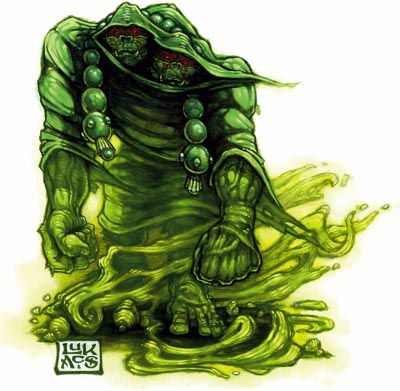
Mummified Creature Template
Mummies are undead creatures, embalmed using ancient necromantic lore. Often set as guardians for sacred sites, mummies defend their charges until destroyed. Should a mummy be unable to defend its charge for any reason, it becomes an unreasoning spirit of vengeance, hunting those who desecrated the site it was tasked to defend.
A mummy appears withered and desiccated, its features hidden beneath centuries-old funereal wrappings. It moves with a slow, shambling gait and groans with the weight of the ages. Symbols of the deity it once served often mark these horrid creatures. While other undead stink of carrion, the herbs and powders used to create a mummy give off a sharp, pungent odor, like that of a spice cabinet.
Only a Huge or smaller giant, humanoid, or monstrosity may become a mummified creature, although the DM may allow creatures of other types to be mummified as appropriate. When a living creature (referred to as the base creature) is transformed into a mummy, it retains its statistics except as described below.
Type. The mummy is an undead, and it doesn't require air, food, drink, or sleep.
Armor Class. The mummy's Armor Class becomes 10 + its Dexterity modifier if it wasn't already, and it loses natural armor or any other source of armor it may have had.
Hit Dice. The mummy gains 3 more hit dice, which increases its maximum hit points.
Speed. The mummy's speed is reduced by 10 feet.
Ability Score Adjustment. The mummy's Strength and Charisma scores are each increased by 2, to a maximum of 22 and to a minimum of 13. Its Dexterity and Intelligence scores are each decreased by 2, to a minimum of 4.
Damage Vulnerabilities, Resistances, and Immunities. The mummy gains resistance to bludgeoning, piercing, and slashing damage from nonmagical attacks. The mummy is also immune to necrotic and poison damage, and it is vulnerable to fire damage. None of the vulnerabilities, resistances, or immunities from the base creature are preserved.
Condition Immunities. The mummy can't be charmed, frightened, paralyzed, or poisoned. It also doesn't suffer from exhaustion.
Senses. The mummy gains darkvision out to 60 feet. If the base creature already had darkvision, the radius of its darkvision instead increases by 60 feet. However, if the base creature has blindsight and is blind beyond its radius, the mummy does not gain darkvision.
Traits, Actions, and Proficiencies. The mummy loses any trait, such as Amphibious, that assumes a living physiology. The mummy might retain or lose any or all of its lair actions or inherit new ones, as the DM sees fit. It also gains additional actions and traits as described in the template's statistics block. Otherwise, the mummy retains the base creature's proficiencies, actions, and traits.
Mummified Creature Template
[Base size] undead, lawful evil
- Armor Class 10 + its Dexterity modifier
- Hit Points base + 3 more hit dice
- Speed base - 10 feet
STR DEX CON INT WIS CHA Base + 2 Base - 2 Base Base - 2 Base Base + 2
- Saving Throws base + Wisdom
- Skills base
- Damage Vulnerabilities fire
- Damage Resistances bludgeoning, piercing, and slashing from nonmagical attacks
- Damage Immunities necrotic, poison
- Condition Immunities base + charmed, exhaustion, frightened, paralyzed, poisoned
- Senses base + darkvision 60 ft., passive Perception [base]
- Languages the languages it knew in life
- Challenge [recalculate]
Additional Traits
Mummy Rot. When the mummy hits a creature with a melee attack using a natural weapon (e.g. a claw, fist, tendril, or hoove attack), the attack deals an additional 10 (3d6) necrotic damage, and the target must succeed on a Constitution saving throw (8 + the mummy's proficiency bonus + its Constitution modifier) or be cursed with mummy rot. The cursed target can't regain hit points, and its hit point maximum decreases by 10 (3d6) for every 24 hours that elapse. If the curse reduces the target's hit point maximum to 0, the target dies, and its body turns to dust. The curse lasts until removed by the remove curse spell or similar magic.
Additional Actions
Multiattack. If the base creature already had the Multiattack action, it can keep it; additionally, the mummy can forgo one attack per turn to use Dreadful Glare. Otherwise, the mummy can use its Dreadful Glare and makes one attack with its rotting fist.
Fist. If the base creature already had a melee attack using a natural weapon (e.g. a claw, fist, tendril, or hoove attack), it doesn't gain this action. Otherwise, this attack uses the mummy's Strength modifier to determine its attack bonus and damage. This attack deals bludgeoning damage to one target, with its damage dice being equal to two of the mummy's hit dice.
Dreadful Glare. The mummy targets one creature it can see within 60 feet of it. If the target can see the mummy, it must succeed on a Wisdom saving throw (DC 8 + the mummy's proficiency bonus + its Charisma modifier) against this magic or become frightened until the end of the mummy's next turn. If the target fails the saving throw by 5 or more, it is also paralyzed for the same duration. A target that succeeds on the saving throw is immune to the Dreadful Glare of all mummies (but not mummy lords) for the next 24 hours.
Mummified Ogre
Large undead, lawful evil
- Armor Class 8
- Hit Points 85 (10d10 + 30)
- Speed 30 ft.
STR DEX CON INT WIS CHA 21 (+5) 6 (–2) 16 (+3) 4 (–3) 7 (–2) 13 (+1)
- Saving Throws Wis +0
- Damage Vulnerabilities fire
- Damage Resistances bludgeoning, piercing, slashing from nonmagical attacks
- Damage Immunities necrotic, poison
- Condition Immunities charmed, exhaustion, frightened, paralyzed, poisoned
- Senses darkvision 120 ft., passive Perception 8
- Languages Common, Giant
- Challenge 4 (1100 XP)
Actions
Multiattack. The mummy uses its Dreadful Glare and makes one melee attack.
Greatclub. Melee Weapon Attack: +7 to hit, reach 5 ft., one target. Hit: 14 (2d8 + 5) bludgeoning damage.
Javelin. Melee or Ranged Weapon Attack: +7 to hit, reach 5 ft. or range 30/120 ft., one target. Hit: 12 (2d6 + 5) piercing damage.
Rotting Fist. Melee Weapon Attack: +7 to hit, reach 5 ft., one target. Hit: 16 (2d10 + 5) bludgeoning damage plus 10 (3d6) necrotic damage. If the target is a creature, it must succeed on a DC 13 Constitution saving throw or be cursed with mummy rot. The cursed target can't regain hit points, and its hit point maximum decreases by 10 (3d6) for every 24 hours that elapse. If the curse reduces the target's hit point maximum to 0, the target dies, and its body turns to dust. The curse lasts until removed by the remove curse spell or other magic.
Dreadful Glare. The mummy targets one creature it can see within 60 feet of it. If the target can see the mummy, it must succeed on a DC 11 Wisdom saving throw against this magic or become frightened until the end of the mummy's next turn. If the target fails the saving throw by 5 or more, it is also paralyzed for the same duration. A target that succeeds on the saving throw is immune to the Dreadful Glare of all mummies (but not mummy lords) for the next 24 hours.
Combat
In melee combat, a mummified ogre delivers a powerful blow. Even if it had no other abilities, its great strength and grim determination would make it a formidable opponent.
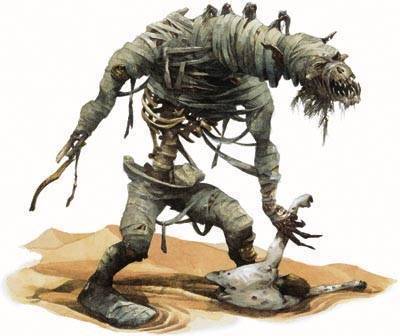
Necromental Template
A necromental is the undead remnant of an elemental creature. It retains only a fraction of the self-awareness that the elemental had in life, but it becomes twisted and evil.
Only an elemental may become a necromental. When an elemental (referred to as the base creature) is transformed into a necromental, it retains its statistics except as described below.
Type. The necromental is an undead, and it doesn't require air, food, drink, or sleep.
Armor Class. The necromental's Armor Class becomes 10 + its Dexterity modifier if it wasn't already, and it loses natural armor or any other source of armor it may have had.
Hit Dice. The necromental gains 3 more hit dice, which increases its maximum hit points.
Ability Score Adjustment. The necromental's Intelligence and Charisma scores are each halved, to a minimum of 1.
Damage Vulnerabilities, Resistances, and Immunities. The necromental gains immunity to necrotic and poison damage.
Condition Immunities. The necromental can't be poisoned or unconscious. It also doesn't suffer from exhaustion.
Senses. The necromental gains darkvision out to 60 feet. If the base creature already had darkvision, the radius of its darkvision instead increases by 60 feet. However, if the base creature has blindsight and is blind beyond its radius, the necromental does not gain darkvision.
Traits, Actions, and Proficiencies. The necromental loses any trait, such as Amphibious, that assumes a living physiology. The necromental might retain or lose any or all of its lair actions or inherit new ones, as the DM sees fit. It also gains additional actions and traits as described in the template's statistics block. Otherwise, the necromental retains the base creature's proficiencies, actions, and traits.
Necromental Template
[Base size] undead, neutral evil
- Armor Class base
- Hit Points base + 3 more hit dice
- Speed base
STR DEX CON INT WIS CHA Base Base Base Base/2 Base Base/2
- Saving Throws base
- Skills base
- Damage Vulnerabilities base
- Damage Resistances base
- Damage Immunities base + necrotic, poison
- Condition Immunities base + charmed, exhaustion, frightened, paralyzed, poisoned
- Senses base + darkvision 60 ft., passive Perception [base]
- Languages understands the languages it spoke in life but can't speak
- Challenge [recalculate]
Additional Traits
Create Spawn. An elemental slain by the necromental rises as a necromental after 24 hours.
Life Draining Aura. At the start of each of the necromental's turns, each creature within 15 feet of it must succeed on a Constitution saving throw (DC 8 + the necromental's proficiency bonus + its Constitution modifer) or take necrotic damage equal to two of the necromental's hit dice. On a failed save, a target's hit point maximum is also reduced by an amount equal to the necrotic damage taken. This reduction lasts until the creature finishes a long rest. The target dies if this effect reduces its hit point maximum to 0.
Touch of Death. When the necromental deals damage to a creature, it can change any amount of the damage to be necrotic damage.
Additional Actions
Disrupt Life (Recharge 6). Each non-undead creature within 20 feet of the necromental must make a Constitution saving throw (DC 8 + the necromental's proficiency bonus + its Constitution modifier) against this magic, taking necrotic damage equal to four of the necromental's hit dice on a failed save, or half as much damage on a successful one.
Earth Necromental
Large undead, neutral evil
- Armor Class 17 (natural armor)
- Hit Points 157 (15d10 + 75)
- Speed 30 ft., burrow 30 ft.
STR DEX CON INT WIS CHA 20 (+5) 8 (–1) 20 (+5) 2 (–4) 10 (+0) 2 (–4)
- Damage Vulnerabilities thunder
- Damage Resistances bludgeoning, piercing, slashing from nonmagical attacks
- Damage Immunities necrotic, poison
- Condition Immunities exhaustion, paralyzed, petrified, poisoned, unconscious
- Senses darkvision 120 ft., tremorsense 60 ft., passive Perception 10
- Languages understands Terran but can't speak
- Challenge 6 (2300 XP)
Create Spawn. An elemental slain by the earth necromental rises as a necromental after 24 hours.
Earth Glide. The earth necromental can burrow through nonmagical, unworked earth and stone. While doing so, the earth necromental doesn't disturb the material it moves through.
Life Draining Aura. At the start of each of the earth necromental's turns, each creature within 15 feet of it must succeed on a DC 16 Constitution saving throw or take 11 (2d10) necrotic damage. On a failed save, a target's hit point maximum is also reduced by an amount equal to the necrotic damage taken. This reduction lasts until the creature finishes a long rest. The target dies if this effect reduces its hit point maximum to 0.
Siege Monster. The earth necromental deals double damage to objects and structures.
Touch of Death. When the earth necromental deals damage to a creature, it can change any amount of the damage to be necrotic damage.
Actions
Multiattack. The earth necromental makes two slam attacks.
Slam. Melee Weapon Attack: +8 to hit, reach 10 ft., one target. Hit: 14 (2d8 + 5) bludgeoning damage.
Disrupt Life (Recharge 6). Each non-undead creature within 20 feet of the earth necromental must make a DC 16 Constitution saving throw against this magic, taking 22 (4d10) necrotic damage on a failed save, or half as much damage on a successful one.
Description
"This walking pile of crumbling earth and stone radiates a palpable aura of death."
Combat
An earth necromental smashes into combat like a typical earth elemental, though with even more devastating results, thanks to its necromantic abilities.
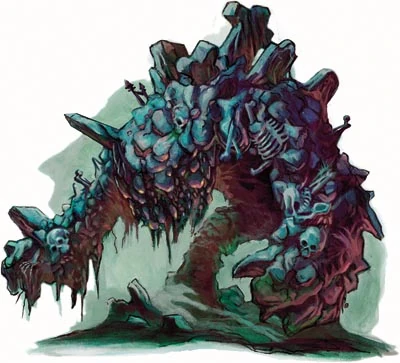
Necropolitan Template
Necropolitans are humanoids who renounce life and embrace undeath in a special ritual called the Ritual of Crucimigration (see below).
A necropolitan's skin is dry, withered, and powdery. Its eyes are as pale as driven snow, and as lifeless. It continues to dress in the fashion it preferred while living. Necropolitans are considered citizens of the little-known city of Nocturnus, but if their nature is revealed elsewhere, they are feared and hunted like common monsters.
Only a humanoid, or monstrosity may become a necropolitan, although the DM may allow creatures of other types to become a necropolitan as appropriate. When a living creature (referred to as the base creature) is transformed into a necropolitan, it retains its statistics except as described below.
Type. The necropolitan is an undead, and it doesn't require air, food, drink, or sleep.
Ability Score Adjustment. The necropolitan's Constitution score increases by 2, to a maximum of 22.
Damage Vulnerabilities, Resistances, and Immunities. The necropolitan is immune to cold, necrotic, and poison damage.
Condition Immunities. The necropolitan can't be charmed, frightened, paralyzed, or poisoned. It also doesn't suffer from exhaustion.
Skills. The necropolitan gains expertise with two skills of its choice, which means its proficiency bonus is doubled for any ability check it makes with it.
Senses. The necropolitan gains darkvision out to 60 feet. If the base creature already had darkvision, the radius of its darkvision instead increases by 60 feet. However, if the base creature has blindsight and is blind beyond its radius, the necropolitan does not gain darkvision.
Traits, Actions, and Proficiencies. The necropolitan loses any trait, such as Amphibious, that assumes a living physiology. The necropolitan might retain or lose any or all of its lair actions or inherit new ones, as the DM sees fit. It also gains additional traits as described in the template's statistics block. Otherwise, the necropolitan retains the base creature's proficiencies, actions, and traits.
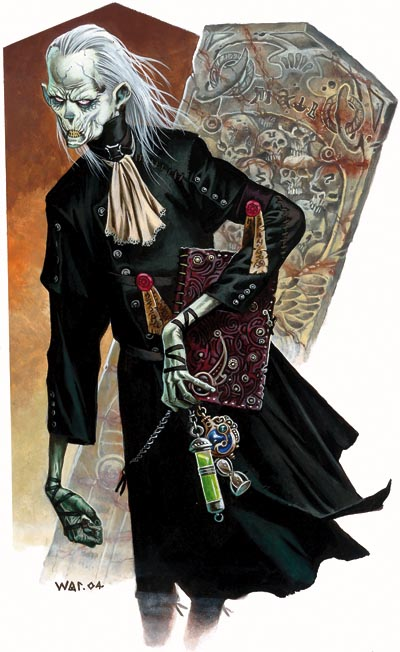
Necropolitan Template
[Base size] undead, [base alignment]
- Armor Class base
- Hit Points base
- Speed base
STR DEX CON INT WIS CHA Base Base Base + 2 Base Base Base
- Saving Throws base + any two saving throws
- Skills base + expertise in any two skills
- Damage Vulnerabilities base
- Damage Resistances base
- Damage Immunities base + cold, necrotic, poison
- Condition Immunities base + charmed, exhaustion, frightened, paralyzed, poisoned
- Senses base + darkvision 60 ft., passive Perception [base]
- Languages the languages it knew in life
- Challenge [recalculate]
Additional Traits
Aversion of Radiance. If the necropolitan takes radiant damage, it has disadvantage on attack rolls and ability checks until the end of its next turn.
Clarity of Death. The necropolitan is immune to any spell or effect that would read its thoughts, determine if it is lying, or magically influence its thoughts or behavior.
Magic Resistance. The necropolitan has advantage on saving throws against spells and other magical effects.
Negative Energy Absorption. Whenever the necropolitan is subjected to necrotic damage, it takes no damage and regains a number of hit points equal to the necrotic damage dealt.
Turn Resistance. The necropolitan has advantage on saving throws against effects that turn undead.
Undead Fortitude. If damage reduces the necropolitan to 0 hit points, it must make a Constitution saving throw with a DC of 5 + the damage taken, unless the damage is radiant or from a critical hit. On a success, the necropolitan drops to 1 hit point instead.
Necropolitan Mage
Medium undead, any alignment
- Armor Class 12 (15 with mage armor)
- Hit Points 49 (9d8 + 9)
- Speed 30 ft.
STR DEX CON INT WIS CHA 9 (–1) 14 (+2) 13 (+1) 17 (+3) 12 (+1) 11 (+0)
- Saving Throws Con +4, Int +6, Wis +4, Cha +3
- Skills Arcana +9, History +9
- Damage Immunities cold, necrotic, poison
- Condition Immunities charmed, exhaustion, frightened, paralyzed, poisoned
- Senses darkvision 60 ft., passive Perception 11
- Languages any four languages
- Challenge 7 (2900 XP)
Aversion of Radiance. If the necropolitan takes radiant damage, it has disadvantage on attack rolls and ability checks until the end of its next turn.
Clarity of Death. The necropolitan is immune to any spell or effect that would read its thoughts, determine if it is lying, or magically influence its thoughts or behavior.
Magic Resistance. The necropolitan has advantage on saving throws against spells and other magical effects.
Negative Energy Absorption. Whenever the necropolitan is subjected to necrotic damage, it takes no damage and regains a number of hit points equal to the necrotic damage dealt.
Spellcasting. The necropolitan is a 9th-level spellcaster. Its spellcasting ability is Intelligence (spell save DC 14, +6 to hit with spell attacks). The necropolitan has the following wizard spells prepared:
Cantrip (at will): fire bolt, mage hand, prestidigitation, toll the dead
1st level (4 slots): detect magic, mage armor, magic missile, shield
2nd level (3 slots): misty step, ray of enfeeblement
3rd level (3 slots): counterspell, fireball, fly
4th level (3 slots): blight, dimension door
5th level (1 slot): cone of coldTurn Resistance. The necropolitan has advantage on saving throws against effects that turn undead.
Undead Fortitude. If damage reduces the necropolitan to 0 hit points, it must make a Constitution saving throw with a DC of 5 + the damage taken, unless the damage is radiant or from a critical hit. On a success, the necropolitan drops to 1 hit point instead.
Actions
Dagger. Melee or Ranged Weapon Attack: +5 to hit, reach 5 ft. or range 20/60 ft., one target. Hit: 4 (1d4 + 2) piercing damage.
Description
"This withered humanoid has eyes so blue they are more accurately described as white, as if drained of color and life. The figure wears severe black clothing and clutches a thin wand in one gnarled hand."
Combat
This necropolitan acts much like a typical mage, though it focuses its attacks on any character prominently displaying a holy symbol or otherwise appearing to be a cleric or paladin.
Ritual of Crucimigration
Any humanoid can petition for consideration to undergo the Ritual of Crucimigration, which (if successful) enables the creature to become a necropolitan. The petition for consideration requires a fee of 3,000 gp and a written plea.
The Ritual: The first part of the ritual requires the placement of the petitioner on a standing pole. Cursed nails are used to affix the petitioner, and then the pole is lifted into place. The resultant excruciating pain that shoots like molten metal through the petitioner's fingers and up the arms is not what finally ends the petitioner's mortal life, however, since death usually comes from asphyxiation and heart failure. As petitioners feel death's chill enter their bodies, many have second thoughts, but it is far too late to go back-the cursed nails and chanting of the ritual ensures that the Crucimigration is completed.
The ceremony lasts for 24 hours—the usual time it takes for the petitioner to perish. During this period, two or three zombie servitors keep up a chant initiated by the ritual leader when the petitioner is first placed into position. Upon hearing the petitioner's last breath, the ritual leader calls forth the names of evil powers and gods to forge a link with the Negative Energy Plane, and then impales the petitioner. Dying, the petitioner is reborn as a necropolitan, dead but animate.
If the ritual is interrupted before it is completed, the petitioner is merely dead.
Swarm-Shifter Template
The vampire that explodes into a flock of bats, the mummy that crumbles into a pile of scorpions-these are swarm-shifters, undead that have been granted the dark power to become swarms.
A swarm-shifter appears like a normal undead creature until its body explodes into a swarm. There are many varieties of swarm-shifters, and although some are more common than others, swarm-shifters do not seem limited to certain kinds of swarms by their form of undeath.
Only an undead creature can become a swarm-shifter. When an undead (referred to as the base creature) becomes a swarm-shifter, it gains the Shapechanger trait below. Note that unlike most templates, an undead can potentially acquire this template more than once, gaining a new swarm option with each application.
Shapechanger. The swarm-shifter can use its bonus action to polymorph into a swarm of undead creatures, chosen from the list of options below when this template was applied. The swarm-shifter can choose whether its equipment falls to the ground, melds with its new form, or is worn by the new form. The swarm-shifter reverts to its true form if it dies or falls unconscious. The swarm-shifter can revert to its true form using a bonus action on its turn.
While in a new form, the swarm-shifter retains its game statistics and ability to speak, but its movement modes, Strength, and Dexterity are replaced by those of the new form, and it gains any special senses, proficiencies, traits, actions, and reactions that the new form has but that it lacks. It loses any attack that relies on the use of its equipment or normal body, and it can cast its spells with verbal or somatic components in its new form.
The new form's attacks count as magical for the purpose of overcoming resistances and immunity to nonmagical attacks. The swarm-shifter can choose to use one of its normal attack bonuses or saving throw DCs in place of an attack bonus or saving throw DC of the new form, respectively. Additionally, the swarm-shifter can choose to keep its original size, or it can become the size denoted in the new form's statistics.
Bloodmote Cloud
The statistics for a bloodmote cloud are found earlier in this bestiary.
Bone Rat Swarm
The statistics for a bone rat swarm are found earlier in this bestiary.
Corpse Rat Swarm
The statistics for a corpse rat swarm are found earlier in this bestiary.
Swarm of Tomb Motes
Medium swarm of tiny undead, chaotic evil
- Armor Class 13
- Hit Points 27 (5d8 + 5)
- Speed 40 ft.
STR DEX CON INT WIS CHA 10 (+0) 16 (+3) 13 (+1) 8 (–1) 12 (+1) 6 (–2)
- Skills Stealth +5
- Damage Resistances bludgeoning, piercing, slashing
- Damage Immunities necrotic, poison
- Condition Immunities charmed, frightened, grappled, paralyzed, petrified, poisoned, prone, restrained, stunned
- Senses darkvision 60 ft., passive Perception 11
- Languages —
- Challenge 2 (450 XP)
Nimble Escape. The swarm can take the Disengage or Hide action as a bonus action on each of its turns.
Swarm. The swarm can occupy another creature's space and vice versa, and the swarm can move through any opening large enough for a Tiny tomb mote. The swarm can't regain hit points or gain temporary hit points.
Actions
Bites. Melee Weapon Attack: +5 to hit, reach 0 ft., one target in the swarm's space. Hit: 14 (4d6) piercing damage, or 7 (2d6) piercing damage if the swarm has half of its hit points or fewer. If the target is a creature, it must make a DC 11 Constitution saving throw. On a failed save, the target is poisoned until the end of the swarm's next turn. On a successful save, the target is immune to being poisoned by any tomb mote for 24 hours.
Swarm of Undead Bats
Medium swarm of tiny undead, neutral evil
- Armor Class 12
- Hit Points 22 (5d8)
- Speed 0 ft., fly 30 ft.
STR DEX CON INT WIS CHA 5 (–3) 15 (+2) 10 (+0) 2 (–4) 12 (+1) 4 (–3)
- Damage Resistances bludgeoning, piercing, slashing
- Damage Immunities poison
- Condition Immunities charmed, frightened, grappled, paralyzed, petrified, poisoned, prone, restrained, stunned
- Senses blindsight 60 ft., darkvision 60 ft., passive Perception 11
- Languages —
- Challenge 1/2 (100 XP)
Echolocation. The swarm can't use its blindsight while deafened.
Keen Hearing. The swarm has advantage on Wisdom (Perception) checks that rely on hearing.
Swarm. The swarm can occupy another creature's space and vice versa, and the swarm can move through any opening large enough for a Tiny bat. The swarm can't regain hit points or gain temporary hit points.
Wounding. If the swarm hits a creature other than an undead or a construct with a melee attack, the target begins to lose 2 (1d4) hit points at the start of each of its turns due to a painful wound. Each time the swarm hits the wounded target with an attack, the damage dealt by the wound increases by 2 (1d4). Any creature can take an action to stanch the wound with a successful DC 10 Wisdom (Medicine) check. The wound also closes if the target receives magical healing.
Actions
Bites. Melee Weapon Attack: +4 to hit, reach 0 ft., one creature in the swarm's space. Hit: 5 (2d4) piercing damage, or 2 (1d4) piercing damage if the swarm has half of its hit points or fewer.
Swarm of Undead Insects
Medium swarm of tiny undead, neutral evil
- Armor Class 12 (natural armor)
- Hit Points 31 (7d8 + 0)
- Speed 20 ft., climb 20 ft.
STR DEX CON INT WIS CHA 3 (–4) 13 (+1) 10 (+0) 1 (–5) 7 (–2) 1 (–5)
- Damage Resistances bludgeoning, piercing, slashing
- Damage Immunities poison
- Condition Immunities charmed, frightened, grappled, paralyzed, petrified, poisoned, prone, restrained, stunned
- Senses blindsight 10 ft., darkvision 60 ft., passive Perception 8
- Languages —
- Challenge 1 (200 XP)
Swarm. The swarm can occupy another creature's space and vice versa, and the swarm can move through any opening large enough for a Tiny insect. The swarm can't regain hit points or gain temporary hit points.
Actions
Bites. Melee Weapon Attack: +3 to hit, reach 0 ft., one target in the swarm's space. Hit: 10 (4d4) piercing damage, or 5 (2d4) piercing damage if the swarm has half of its hit points or fewer. If the target is a creature, it must make a DC 10 Constitution saving throw, taking 10 (4d4) necrotic damage on a failed save, or half as much damage on a successful one.
Swarm of Undead Leeches
Medium swarm of tiny undead, neutral evil
- Armor Class 10
- Hit Points 22 (5d8)
- Speed 10 ft., climb 10 ft.
STR DEX CON INT WIS CHA 3 (–4) 11 (+0) 10 (+0) 1 (–5) 5 (–3) 1 (–5)
- Damage Resistances bludgeoning, piercing, slashing
- Damage Immunities poison
- Condition Immunities charmed, frightened, grappled, paralyzed, petrified, poisoned, prone, restrained, stunned
- Senses blindsight 10 ft., darkvision 60 ft., passive Perception 7
- Languages —
- Challenge 1/2 (100 XP)
Swarm. The swarm can occupy another creature's space and vice versa, and the swarm can move through any opening large enough for a Tiny leech. The swarm can't regain hit points or gain temporary hit points.
Actions
Bites. Melee Weapon Attack: +2 to hit, reach 0 ft., one creature in the swarm's space. Hit: 5 (2d4) piercing damage, or 2 (1d4) piercing damage if the swarm has half of its hit points or fewer. The target must make a DC 10 Constitution saving throw, taking 5 (2d4) necrotic damage on a failed save, or half as much damage on a successful one. As an exception to its Swarm trait, the swarm regains a number of hit points equal to half the amount of necrotic damage dealt.
Swarm of Undead Maggots or Worms
Medium swarm of tiny undead, neutral evil
- Armor Class 12
- Hit Points 31 (7d8)
- Speed 10 ft., climb 10 ft.
STR DEX CON INT WIS CHA 2 (–4) 15 (+2) 10 (+0) 1 (–5) 2 (–4) 1 (–5)
- Damage Resistances bludgeoning, piercing, slashing
- Damage Immunities poison
- Condition Immunities charmed, frightened, grappled, paralyzed, petrified, poisoned, prone, restrained, stunned
- Senses blindsight 10 ft., darkvision 60 ft., passive Perception 6
- Languages —
- Challenge 1 (200 XP)
Swarm. The swarm can occupy another creature's space and vice versa, and the swarm can move through any opening large enough for a Tiny maggot. The swarm can't regain hit points or gain temporary hit points.
Actions
Bites. Melee Weapon Attack: +4 to hit, reach 0 ft., one target in the swarm's space. Hit: 10 (4d4) piercing damage, or 5 (2d4) piercing damage if the swarm has half of its hit points or fewer.
Plague of Worms. Each creature in the swarm's space must succeed on a DC 12 Dexterity saving throw or take 5 (2d4) necrotic damage and be blinded by the swarm until the end of the swarm's next turn.
Swarm of Undead Parts
Medium swarm of tiny undead, neutral evil
- Armor Class 11
- Hit Points 31 (7d8)
- Speed 10 ft., fly 40 ft.
STR DEX CON INT WIS CHA 15 (+2) 13 (+1) 10 (+0) 1 (–5) 2 (–4) 1 (–5)
- Skills Athletics +4
- Damage Resistances bludgeoning, piercing, slashing
- Damage Immunities poison
- Condition Immunities charmed, frightened, grappled, paralyzed, petrified, poisoned, prone, restrained, stunned
- Senses blindsight 30 ft. (blind beyond this radius), passive Perception 6
- Languages —
- Challenge 1 (200 XP)
Appendages. The swarm can attempt to grapple or shove a creature as a bonus action. Creatures that are grappled by the swarm are unable to breathe or speak until the grapple ends.
Swarm. The swarm can occupy another creature's space and vice versa, and the swarm can move through any opening large enough for a Tiny humanoid body part. The swarm can't regain hit points or gain temporary hit points.
Actions
Slams. Melee Weapon Attack: +4 to hit, reach 0 ft., one target in the swarm's space. Hit: 10 (4d4) bludgeoning damage, or 5 (2d4) bludgeoning damage if the swarm has half of its hit points or fewer.
Swarm of Undead Scorpions
Medium swarm of tiny undead, neutral evil
- Armor Class 12
- Hit Points 24 (7d8 – 7)
- Speed 10 ft.
STR DEX CON INT WIS CHA 4 (–3) 15 (+2) 8 (–1) 1 (–5) 2 (–4) 1 (–5)
- Damage Resistances bludgeoning, piercing, slashing
- Damage Immunities poison
- Condition Immunities charmed, frightened, grappled, paralyzed, petrified, poisoned, prone, restrained, stunned
- Senses blindsight 10 ft., darkvision 60 ft., passive Perception 6
- Languages —
- Challenge 1/2 (100 XP)
Swarm. The swarm can occupy another creature's space and vice versa, and the swarm can move through any opening large enough for a Tiny scorpion. The swarm can't regain hit points or gain temporary hit points.
Actions
Bites. Melee Weapon Attack: +4 to hit, reach 0 ft., one creature in the swarm's space. Hit: 5 (2d4) piercing damage, or 2 (1d4) piercing damage if the swarm has half of its hit points or fewer. The target must make a DC 9 Constitution saving throw, taking 4 (1d8) poison damage on a failed save, or half as much damage on a successful one.
Swarm of Undead Spiders
Medium swarm of tiny undead, neutral evil
- Armor Class 12 (natural armor)
- Hit Points 22 (5d8)
- Speed 20 ft., climb 20 ft.
STR DEX CON INT WIS CHA 3 (–4) 13 (+1) 10 (+0) 1 (–5) 7 (–2) 1 (–5)
- Damage Resistances bludgeoning, piercing, slashing
- Damage Immunities poison
- Condition Immunities charmed, frightened, grappled, paralyzed, petrified, poisoned, prone, restrained, stunned
- Senses blindsight 10 ft., darkvision 60 ft., passive Perception 8
- Languages —
- Challenge 1/2 (100 XP)
Spider Climb. The swarm can climb difficult surfaces, including upside down on ceilings, without needing to make an ability check.
Swarm. The swarm can occupy another creature's space and vice versa, and the swarm can move through any opening large enough for a Tiny spider. The swarm can't regain hit points or gain temporary hit points.
Unsettling Form. Non-undead creatures in the swarm's space have disadvantage on saving throws against being frightened.
Web Sense. While in contact with a web, the swarm knows the exact location of any other creature in contact with the same web.
Web Walker. The swarm ignores movement restrictions caused by webbing.
Actions
Bites. Melee Weapon Attack: +3 to hit, reach 0 ft., one creature in the swarm's space. Hit: 10 (4d4) piercing damage, or 5 (2d4) piercing damage if the swarm has half of its hit points or fewer. The target must succeed on a DC 10 Constitution saving throw or be poisoned until the end of the swarm's next turn.
Swarm-Shifter Mummy
Medium undead (shapechanger), lawful evil
- Armor Class 11 (natural armor)
- Hit Points 58 (9d8 + 18)
- Speed 20 ft. (mummy form) or 10 ft. (swarm form)
STR DEX CON INT WIS CHA 16 (+3) 8 (–1) 15 (+2) 6 (–2) 10 (+0) 12 (+1)
- Saving Throws Wis +2
- Damage Vulnerabilities fire
- Damage Resistances bludgeoning, piercing, and slashing from nonmagical attacks; bludgeoning, piercing, and slashing (swarm form only)
- Damage Immunities necrotic, poison
- Condition Immunities charmed, exhaustion, frightened, paralyzed, poisoned; grappled, petrified, prone, restrained, stunned (swarm form only)
- Senses darkvision 60 ft.; blindsight 10 ft. (swarm form only), passive Perception 10
- Languages the languages it knew in life
- Challenge 3 (700 XP)
Mummy Rot. When the mummy hits a creature with a melee attack, the attack deals an additional 10 (3d6) necrotic damage, and the target must succeed on a DC 12 Constitution saving throw or be cursed with mummy rot. The cursed target can't regain hit points, and its hit point maximum decreases by 10 (3d6) for every 24 hours that elapse. If the curse reduces the target's hit point maximum to 0, the target dies, and its body turns to dust. The curse lasts until removed by the remove curse spell or similar magic.
Shapechanger. The mummy can use its bonus action to polymorph into a swarm of undead scorpions. The mummy can choose whether its equipment falls to the ground, melds with its new form, or is worn by the new form. The mummy reverts to its true form if it dies or falls unconscious. The mummy can revert to its true form using a bonus action on its turn.
While in its new form, the mummy retains its game statistics and ability to speak, but its movement modes, Strength, and Dexterity are replaced by those of the new form, and it gains any special senses, proficiencies, traits, actions, and reactions that the new form has but that it lacks (such actions and traits are included in this stat block).
The new form's attacks count as magical for the purpose of overcoming resistances and immunity to nonmagical attacks.Swarm (Swarm Form Only). The mummy can occupy another creature's space and vice versa, and the mummy can move through any opening large enough for a Tiny scorpion. The mummy can't regain hit points or gain temporary hit points.
Actions
Multiattack. The mummy uses its Dreadful Glare and makes one melee attack.
Rotting Fist (Mummy Form Only). Melee Weapon Attack: +5 to hit, reach 5 ft., one target. Hit: 10 (2d6 + 3) bludgeoning damage.
Bites (Swarm Form Only). Melee Weapon Attack: +5 to hit, reach 0 ft., one creature in the mummy's space. Hit: 5 (2d4) piercing damage, or 2 (1d4) piercing damage if the mummy has half of its hit points or fewer. The target must make a DC 12 Constitution saving throw, taking 4 (1d8) poison damage on a failed save, or half as much damage on a successful one.
Dreadful Glare. The mummy targets one creature it can see within 60 feet of it. If the target can see the mummy, it must succeed on a DC 11 Wisdom saving throw against this magic or become frightened until the end of the mummy's next turn. If the target fails the saving throw by 5 or more, it is also paralyzed for the same duration. A target that succeeds on the saving throw is immune to the Dreadful Glare of all mummies (but not mummy lords) for the next 24 hours.
Description
"A skittering swarm of scorpions five feet across approaches you. The swarm contracts, merging together and compacting. Suddenly, it coalesces into a withered corpse in funeral wrappings."
Combat
A swarm-shifter mummy acts much like a regular mummy. It typically prefers to fight while in swarm form, but it may transform back if it is reduced to half of its hit points or fewer. It may also transform into a swarm as a method of escape - while its swarm form is even slower than its mummy form, its Swarm trait allows it to escape via small openings that its mummy form wouldn't fit through.
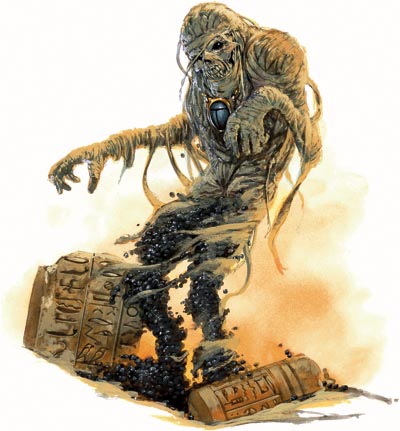
Umbral Creature Template
Like shadows, umbral creatures are creatures of living darkness. They hate life and light with equal fervor. Their touch bestows the painful chill of nonexistence, making them very dangerous opponents.
An umbral creature looks like a shadowy version of a material creature, and it may easily be mistaken for a living creature from the Plane of Shadow. Umbral creatures are diffi cult to see in dark or gloomy areas, but they stand out starkly in brightly illuminated places.
Natural enemies of all that live, umbral creatures are aggressive and predatory. They are quick to strike and make short work of those unprepared to deal with them.
Only an aberration, dragon, giant, beast, or monstrosity may become an umbral creature; humanoids become shadows (MM 269) instead. When a living creature (referred to as the base creature) becomes an umbral creature, it retains its statistics except as described below.
Type. The umbral creature is an undead, and it doesn't require air, food, drink, or sleep.
Armor Class. The umbral creature's Armor Class becomes 10 + its Dexterity modifier if it wasn't already, and it loses natural armor or any other source of armor it may have had.
Speed. The umbral creature's walking speed increases by 10 feet, and it loses all other forms of movement.
Ability Score Adjustment. The umbral creature's Dexterity score increases by 2, to a maximum of 22 and a minimum of 14. However, if its Strength score is higher than its new Dexterity score, the umbral creature's Dexterity rises to match its Strength. Its Strength score is then halved, to a minimum of 1.
Damage Vulnerabilities, Resistances, and Immunities. The umbral creature has the same vulnerabilities, resistances, and immunities as a shadow (MM 269). None of the vulnerabilities, resistances, or immunities from the base creature are preserved.
Condition Immunities. The umbral creature can't be frightened, grappled, paralyzed, petrified, poisoned, prone, or restrained. It also doesn't suffer from exhaustion.
Senses. The umbral creature gains darkvision out to 60 feet. If the base creature already had darkvision, the radius of its darkvision instead increases by 60 feet. The umbral creature loses all other senses.
Traits, Actions, and Proficiencies. The umbral creature loses any trait, such as Amphibious, that assumes a living physiology, as well as any trait that relies on being corporeal, such as Spider Climb or Standing Leap. The umbral creature might retain or lose any or all of its lair actions or inherit new ones, as the DM sees fit. It also gains additional actions and traits as described in the template's statistics block. Otherwise, the umbral creature retains the base creature's proficiencies, actions, and traits.
Umbral Creature Template
[Base size] undead, chaotic evil
- Armor Class 10 + its Dexterity modifier
- Hit Points base
- Speed base + 10 feet
STR DEX CON INT WIS CHA Base/2 See Template Base Base Base Base
- Saving Throws base
- Skills base + Stealth
- Damage Vulnerabilities radiant
- Damage Resistances acid, fire, lightning, thunder; bludgeoning, piercing, and slashing from nonmagical attacks
- Damage Immunities necrotic, poison
- Condition Immunities base + exhaustion, frightened, grappled, paralyzed, petrified, poisoned, prone, or restrained
- Senses base + darkvision 60 ft., passive Perception [base]
- Languages the languages it knew in life
- Challenge [recalculate]
Additional Traits
Amorphous. The umbral creature can move through a space as narrow as 1 inch wide without squeezing.
Create Spawn. When a non-evil humanoid is slain by the umbral creature, a shadow rises from its corpse 1d4 hours later.
Shadow Stealth. While in dim light or darkness, the umbral creature can take the Hide action as a bonus action, and its proficiency bonus is doubled for any check it makes using the Stealth skill.
Strength Drain. When the umbral creature deals damage to a creature, the target's Strength score is reduced by 1d4. The target dies if this reduces its Strength to 0. Otherwise, the reduction lasts until the target finishes a short or long rest.
Sunlight Weakness. While in sunlight, the umbral creature has disadvantage on attack rolls, ability checks, and saving throws.
Additional Actions
Withering Touch. If the base creature already had access to a melee weapon attack, it doesn't gain this action; if the attack is made with a natural weapon (e.g. a claw, fist, tendril, or hoove attack), it deals necrotic damage instead of its normal damage type, while if it is made with a manufactured weapon, the attack deals additional necrotic damage equal to one of the umbral creature's hit dice. Otherwise, this attack uses the umbral creature's Dexterity modifier to determine its attack bonus and damage. This attack deals necrotic damage to one creature, with its damage dice being equal to two of the umbral creature's hit dice.
Umbral Displacer Beast
Large undead, chaotic evil
- Armor Class 14
- Hit Points 85 (10d10 + 30)
- Speed 50 ft.
STR DEX CON INT WIS CHA 9 (–1) 18 (+4) 16 (+3) 6 (–2) 12 (+1) 8 (–1)
- Skills Stealth +7
- Damage Vulnerabilities radiant
- Damage Resistances acid, cold, fire, lightning, thunder; bludgeoning, piercing, and slashing from nonmagical attacks
- Damage Immunities necrotic, poison
- Condition Immunities exhaustion, frightened, grappled, paralyzed, petrified, poisoned, prone, restrained
- Senses darkvision 120 ft., passive Perception 11
- Languages —
- Challenge 5 (1800 XP)
Amorphous. The umbral displacer beast can move through a space as narrow as 1 inch wide without squeezing.
Avoidance. If the umbral displacer beast is subjected to an effect that allows it to make a saving throw to only take half damage, it instead takes no damage if it succeeds on the saving throw, and only half damage if it fails.
Displacement. The umbral displacer beast projects a magical illusion that makes it appear to be standing near its actual location, causing attack rolls against it to have disadvantage. If it is hit by an attack, this trait is disrupted until the end of its next turn. This trait is also disrupted while the umbral displacer beast is incapacitated or has a speed of 0.
Shadow Stealth. While in dim light or darkness, the umbral displacer beast can take the Hide action as a bonus action. Its stealth bonus is also improved to +10.
Sunlight Weakness. While in sunlight, the umbral displacer beast has disadvantage on attack rolls, ability checks, and saving throws.
Actions
Multiattack. The umbral displacer beast makes two attacks with its tentacles.
Tentacle. Melee Weapon Attack: +6 to hit, reach 10 ft., one creature. Hit: 11 (2d6 + 4) necrotic damage, and the target's Strength score is reduced by 1d4. The target dies if this reduces its Strength to 0. Otherwise, the reduction lasts until the target finishes a short or long rest.
If a non-evil humanoid dies from this attack, a new shadow rises from the corpse 1d4 hours later.
Description
"A murky, vaguely feline shape crouches before you."
Combat
Umbral displacer beasts rely on their incorporeal-esque nature and their natural displacement to avoid most attacks. Due to their limited Intelligence, they don't typically take full advantage of their abilities, such as focusing targets with less Strength in an attempt to kill them first.
